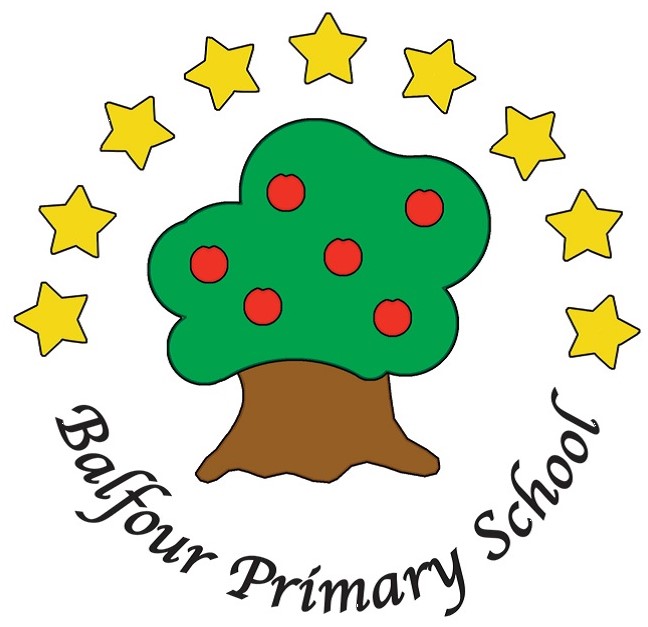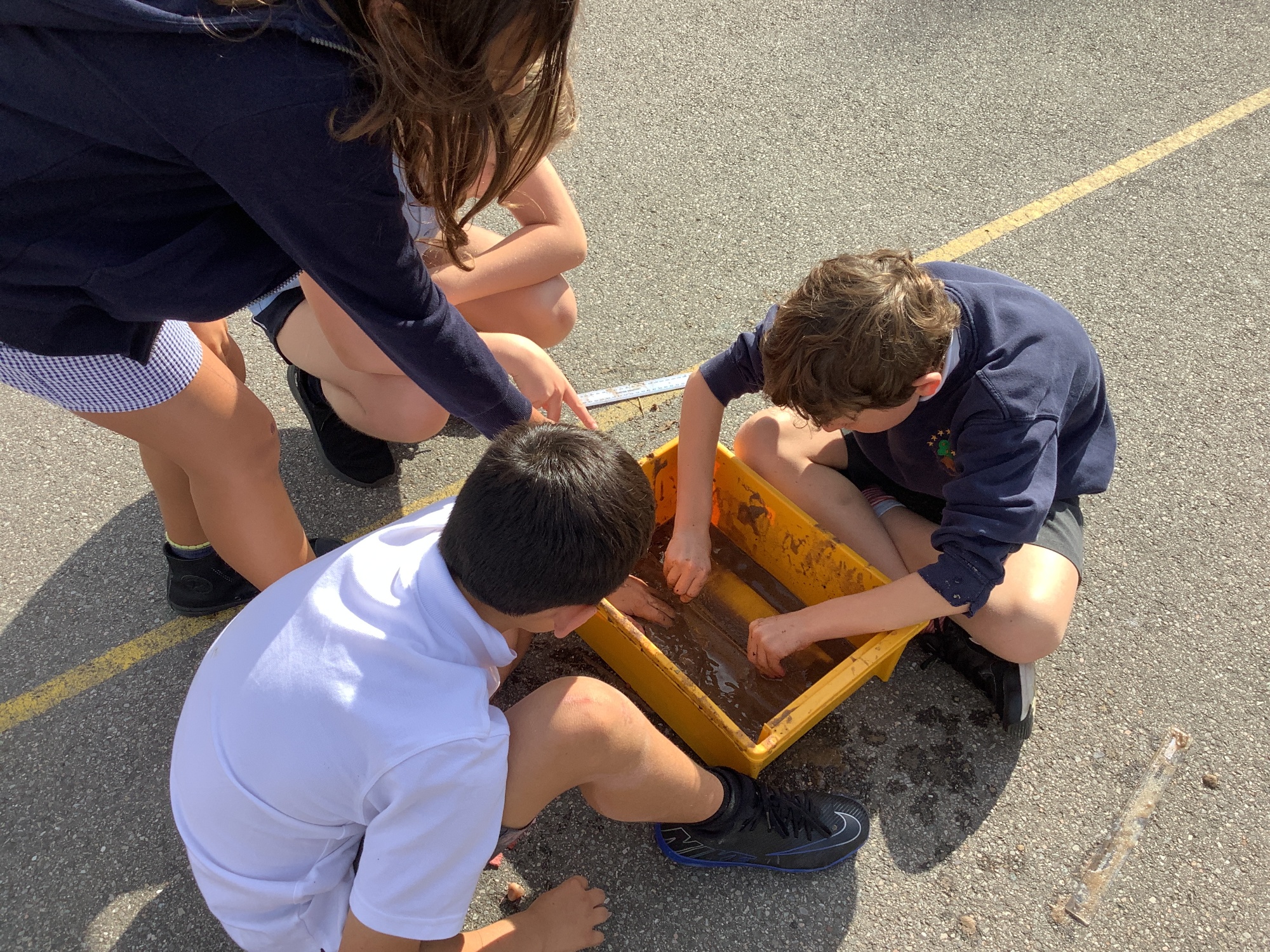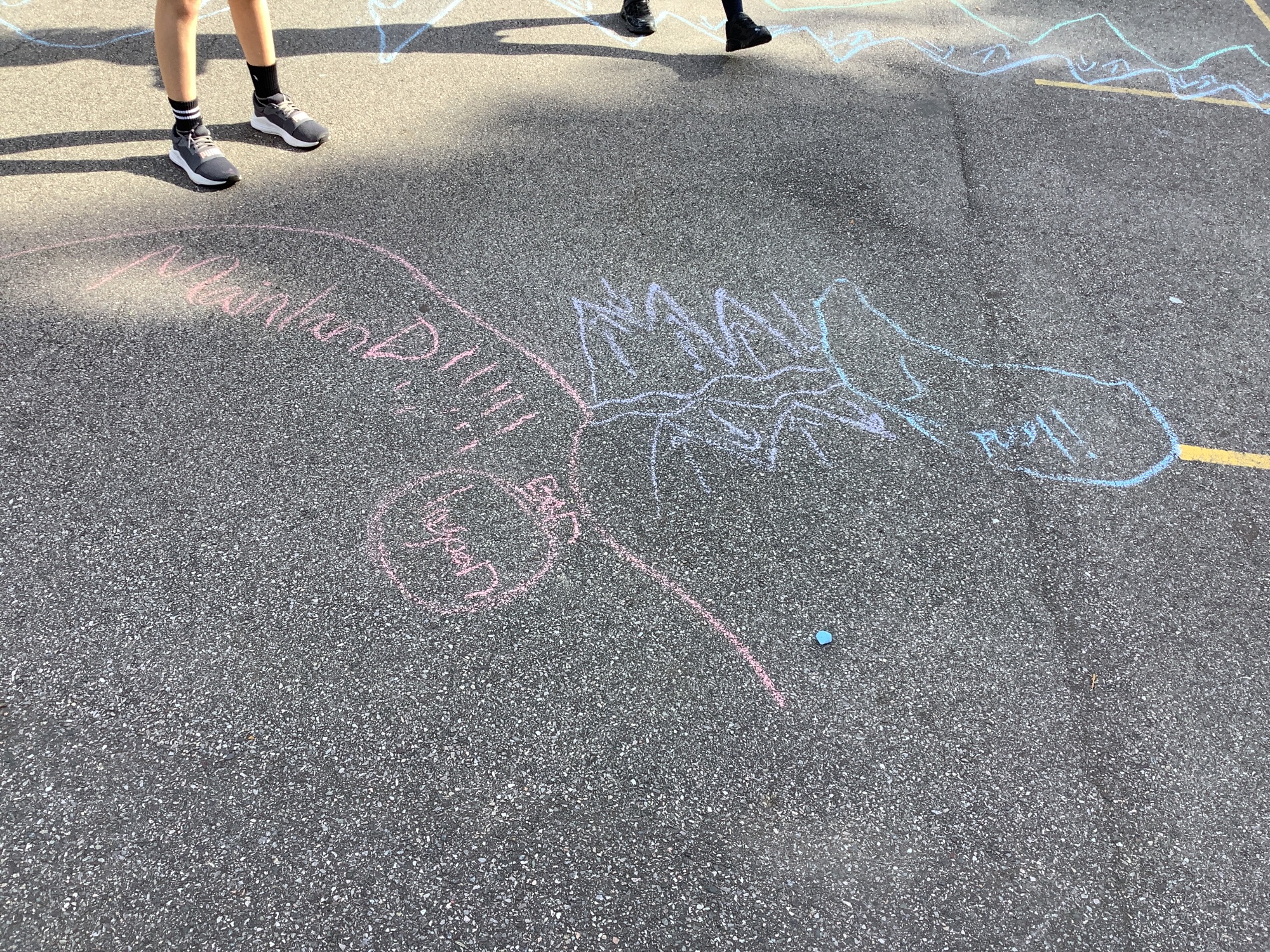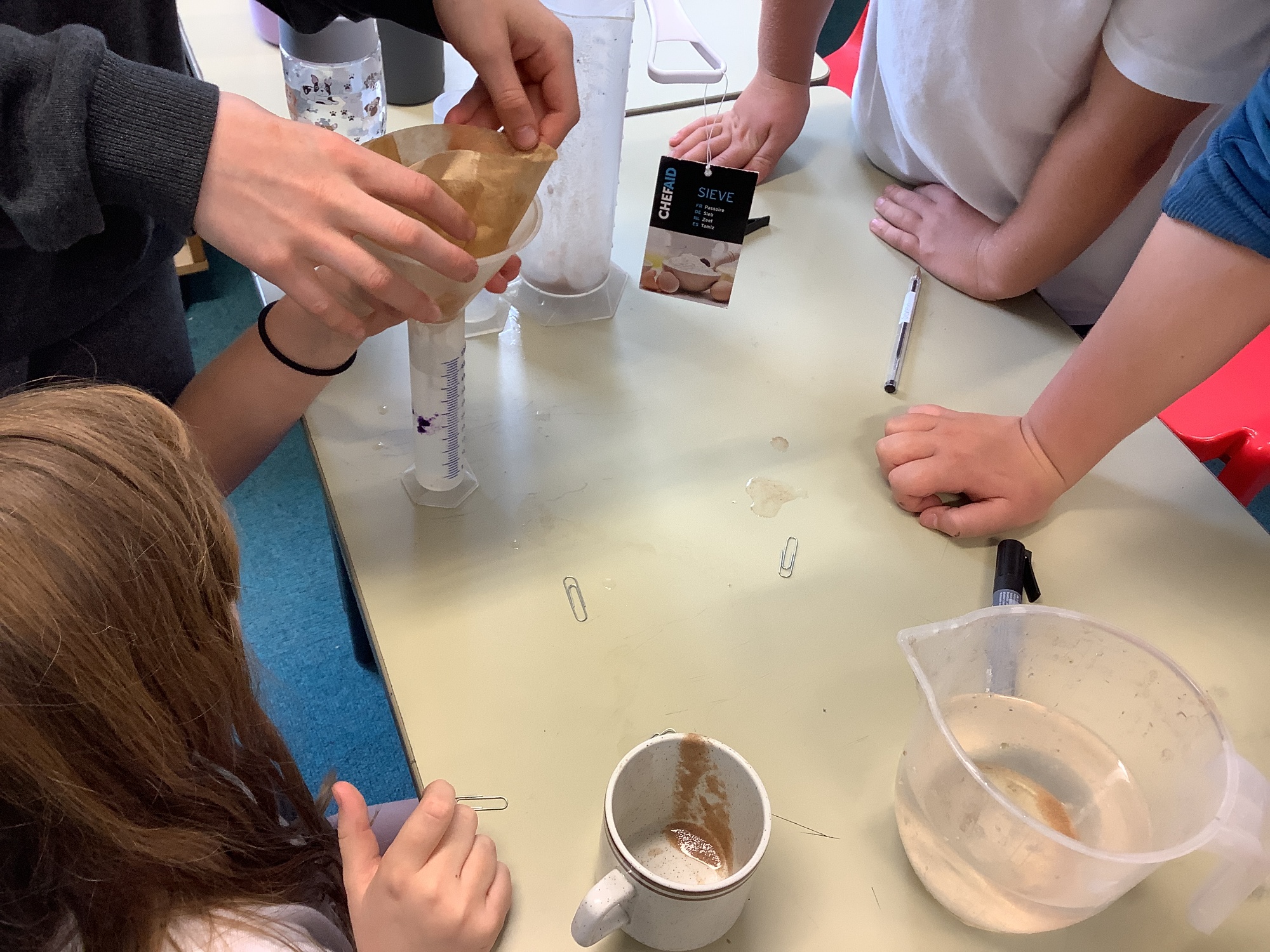Year 5
What we are learning this week:
Summer 2, Week 7
English: This week, we have continued to learn about the features of poetry, and applied them by writing our own poems to perform to the rest of our classes.
At home: Look out for books and poems in the library or on the shelves at home and practise a performance!
Maths: We’ve been learning about Roman Numerals, including some key numbers that are the basis for many others. We’ve converted Roman Numerals to digits and vice versa, as well as doing some addition, subtraction and multiplication of Roman Numerals.
At home: Look for examples of Roman Numerals around the home and outside of school, reading them where possible, or practise writing your own.
Computing: We’ve been busy creating our own virtual reality environments using Cospaces software on ipads and have explored each other’s as part of the lesson.
Summer 2, Week 6
English: This week, we have been looking at the features of poetry, including structure and punctuation. We then practised performing them in front of the class.
At home: Look out for books and poems in the library or on the shelves at home and practise a performance!
Maths: We’ve been learning about angles, learning about how many degrees are in a full, half and quarter turn. We’ve recapped what a right angle is and compared acute, obtuse, straight and reflex angles. We’ve also estimated the size of angles and used protractors to measure and draw our own angles.
At home: Practise finding right, acute, obtuse, straight and reflex angles and if you have a protractor, measure them.
Art: We’ve been busy creating our clay sculptures ready to invite everyone in to see them on 22nd July to see them.
Summer 2, Week 5
English: This week, we have started our performance poetry topic and have been learning about what makes a good performance of a poem. We’ve watched well known and less well known poets perform their work and listed what made them successful, with a view to using these techniques in our own performances.
At home: Look out for poems and performances that entertain you and consider why they are so good.
Maths: We have continued to complete our end of year assessments, while continuing to learn about converting measures in our normal maths lessons.
At home: Practise converting between small and large units of measurement for length, mass and volume. You can also begin to think about angles for our final topic of the year.
Summer 2, Week 4
English: This week, we have been finishing our letters from Kester to his dad to ask for help. We’ve published them in a small format so that the White Pigeon can deliver them safely and get help for the animals!
At home: Think about poems that you’ve read and enjoyed in the past in preparation for our performance poetry topic next week.
Maths: We have been taking part in end-of year assessments, while continuing to learn about converting measures in our normal maths lessons.
At home: Practise converting between small and large units of measurement for length, mass and volume.
Summer 2, Week 3
English: This week, we have been recapping what we’ve read so far in The Last Wild, and mapped out events in chronological order. We’ve also been using descriptive language to describe places and characters that can then be included in a recount in the coming weeks.
At home: Continue discussing things that have happened (especially fun, real life things!), in the order they took place and with a good level of detail and description.
Maths: We’ve been learning about units of measurement and finding length, capacity and mass, with a particular focus on conversion of units and decimal and fraction measurements e.g. how many grams are in a kilogram, how many millilitres are in a litre, and then finding parts of them and converting them using fractions and decimals.
At home: Do some cooking and discuss the measurements involved and how they can be expressed in different ways as fractions and decimals.
Following our entry by two year five children into the ‘Britain’s Funniest Class’ competition, we also had the Beano Bus in this week to visit! We were proud to be a top ten finalist and had great fun on the bus, telling jokes and getting free gifts!
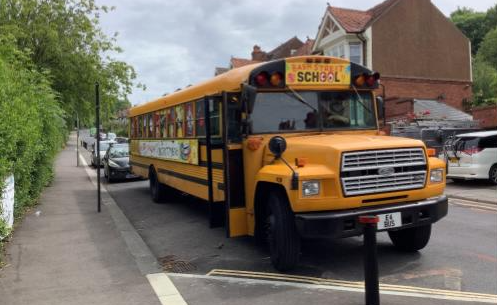
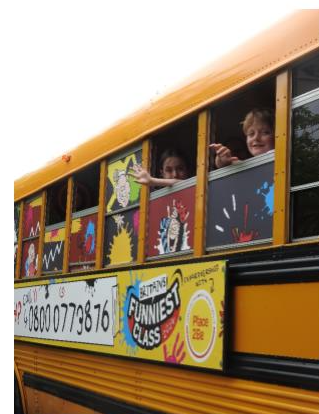

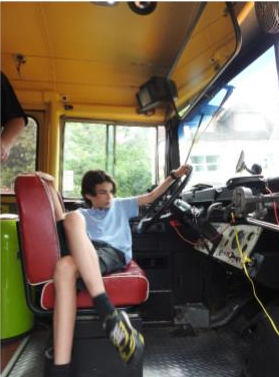
Summer 2, Week 2
English: This week, we have been writing our persuasive speeches about closing or reforming Spectrum Hall, a setting from our current book (The Last Wild). The children did very well and performed their speeches with emotion!
At home: We will be learning about recounts next week so practise discussing things that have happened, in the order they took place and with a good level of detail and description.
Maths: We have been finishing our work on fractions, and the week ended with an assessment of all that the children have learnt over recent months about fractions, decimals and equivalence.
At home: Begin to practise measuring length, capacity and mass, with a particular focus on conversion of units and decimal and fraction measurements e.g. 20cm=0.2m.
Summer 2, Week 1
English: This week, we have been learning about the elements of a persuasive campaign, with a particular focus on speeches. We’ve watched examples of persuasive speeches by well known figures and identified the features of them that make them effective. Some classes have also discussed the upcoming election and how campaigns might be used to influence voters.
At home: Continue looking at leaflets and other elements of persuasive campaigns and discuss adverts and other examples where decisions and behaviour are being influenced.
Maths: We have been continuing our work on fractions, recapping learning from before half term and building on equivalent fractions work through simplification and problem solving.
At home: Look for equivalent fractions in everyday life and consider why we simplify fractions e.g. why a recipe might give amounts in halves and quarters instead of other denominations.
Science: On Tuesday, we had a visit from Brighton Energy Cooperative. They ran a workshop about energy production and use, and children got hands on to make solar powered buggies, which they then tested outside.

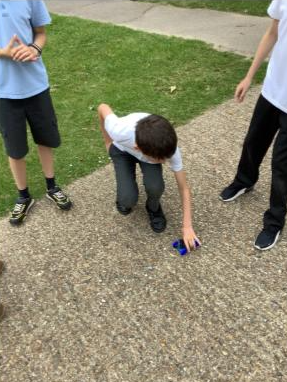
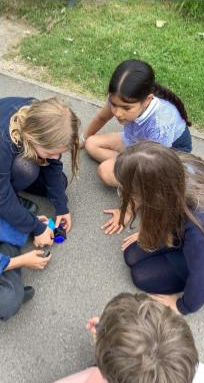
Summer 1, Week 6
English: This week, we have been writing and publishing newspaper reports about the encounter between the Iron Man and the Space Bat Angel Dragon. This has included writing headlines and using direct and reported speech to share what witnesses thought about the events and the finished pieces of work look great!
At home: Begin looking at leaflets and other elements of persuasive campaigns ready for Summer 2, particularly with the announcement of the general election coming up.
Maths: We have been continuing our work on fractions, as well as learning about money management and ethical spending for numeracy day on Wednesday 22nd May.
At home: Think about how you manage your money and the balance between saving and spending.
Science: On Thursday afternoon, Y5 welcomed science students and teachers from Varndean in, who ran a classifying organisms workshop. The children have been learning about life cycles and loved looking at a selection of pond creatures, especially tadpoles before they go through metamorphosis to become frogs.
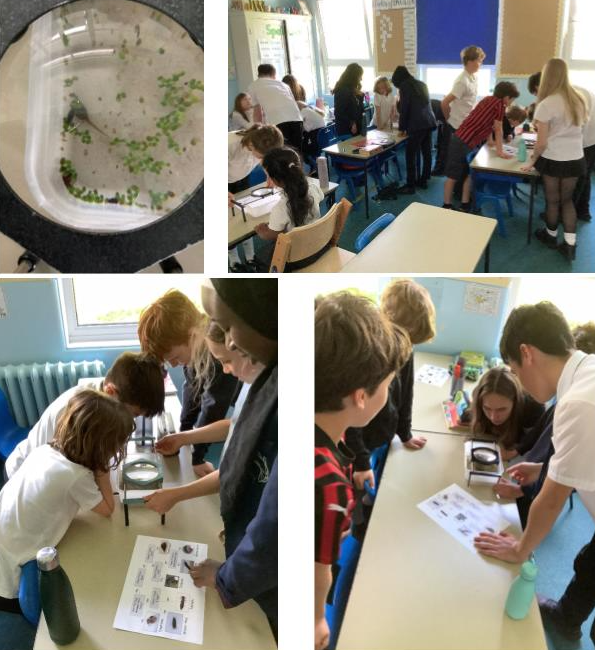
Summer 1, Week 5
English: This week, we have been rehearsing the skills we need to write newspaper reports about the encounter between the Iron Man and the Space Bat Angel Dragon. This has included writing headlines and using direct and reported speech to share what witnesses thought about the events.
At home: Look for direct and report speech in stories and newspapers.
Maths: We have been comparing fractions and drawing diagrams to find and demonstrate equivalence.
At home: look for fractions of amounts in everyday objects and find equivalent fractions if possible.
Computing: We have been busy creating interactive games using Google Slides. This has involved creating a large number of slides with text boxes and creating hyperlinks to navigate through the story when clicked on.
Design Technology: We are also working hard on our bags, made using recycled fabric, and we look forward to welcoming you into the classrooms next week to help finish them.
Summer 1, Week 4
English: This week, we have begun to learn about the features of newspaper reports, in preparation for writing one based on the second part of The Iron Man. This has included the 5W’s and direct and reported speech.
At home: Continue to have a look at some newspapers, and try to find the features we’ve learnt about in class.
Maths: We have continued to learn about fractions, including multiplying a mixed number by a whole number, finding a unit fraction of a number and explaining the relationship between finding a fraction of a quantity and multiplying a whole number by a unit fraction.
At home: Please continue to practise TTRockstars at home –knowing times tables facts and their related division facts as we are using this knowledge to help us with fractions.
DT: We’ve begun making prototypes of our bags that we designed. Please see a separate message for information about coming in to work on these with the children.
Summer 1, Week 3
English: This week, we have writing our stories based on The Iron Man. They have included paragraphs, expanded noun phrases, prepositional phrases and direct speech. There has also been a focus on audience and we will be sharing our stories with our buddy classes in Year Two.
At home: Begin to have a look at some newspapers, in preparation for our next topic.
Maths: We have continued to learn about fractions, including multiplying proper and improper fractions by a whole number, and multiplying a mixed number by a whole number.
At home: Please continue to practise TTRockstars at home –knowing times tables facts and their related division facts as we are using this knowledge to help us with fractions.
History: We have been continuing our enquiry into why Athens became so powerful and how they won the Battle of Marathon.
Summer 1, Week 2
English: This week, we have been practising our skills using cohesion and speech as well as finishing more of the Iron Man story.
At home: Investigate how speech is punctuated in books you read.
Maths: We have started our learning about fractions and understanding that adding the same fraction many times is the same as multiplying fractions by a whole number.
At home: Please continue to practise TTRockstars at home –knowing times tables facts and their related division facts as we are using this knowledge to help us multiply and divide decimals.
Art: UK class had a fantastic time visiting the beach to complete watercolour pictures of the West Pier or Palace Pier. Thanks to the parents who supported our trips – it was much appreciated. You will be able to see our art work at the art exhibition in May.

Summer 1, Week 1
English: This week, we have started exploring our new text, ‘The Iron Man’. We have designed our own climate change robots using noun and prepositional phrases.
At home: Can you find any other books linked to robots?
Maths: We have been learning about common factors and common multiples.
At home: Please continue to practise TTRockstars at home –knowing times tables facts and their related division facts as we are using this knowledge to help us multiply and divide decimals.
Art: we have had a fantastic time visiting the beach to complete watercolour pictures of the West Pier or Palace Pier. Thanks to the parents who supported our trips – it was much appreciated. You will be able to see our art work at the art exhibition in May.
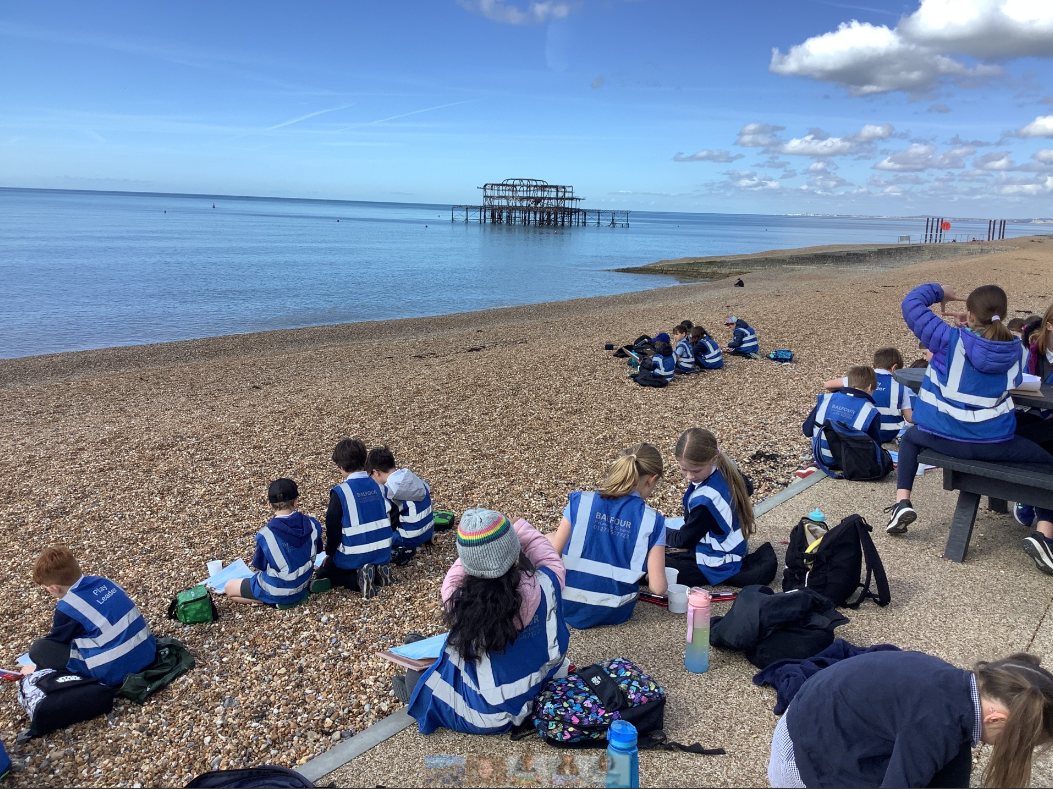
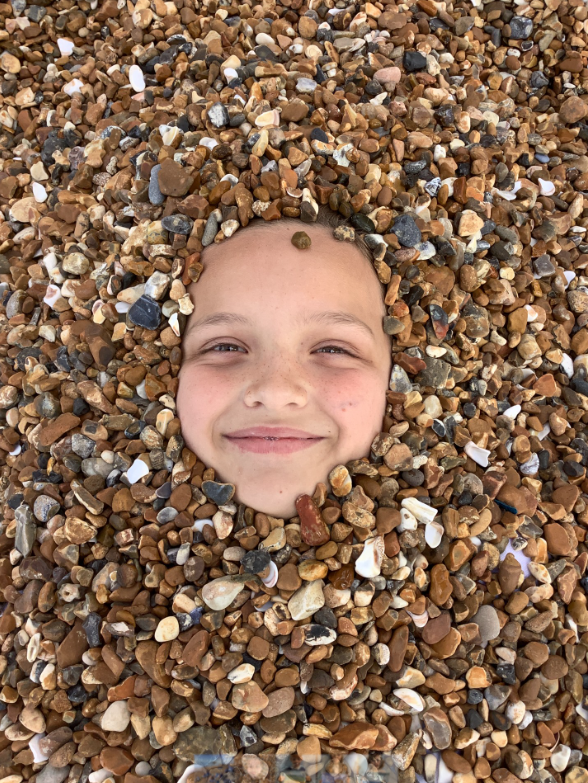
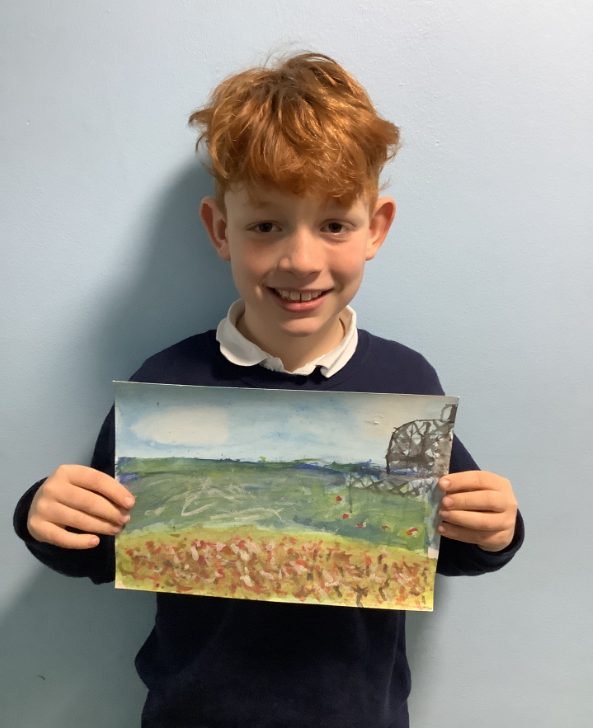
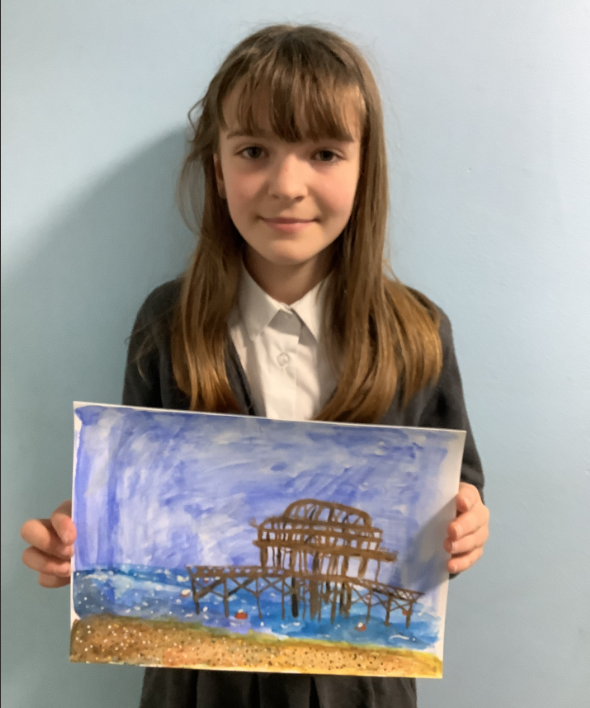
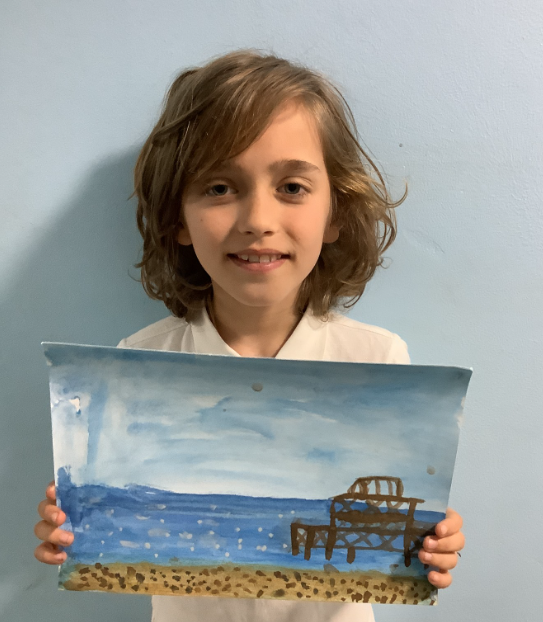
Spring 2, Week 6
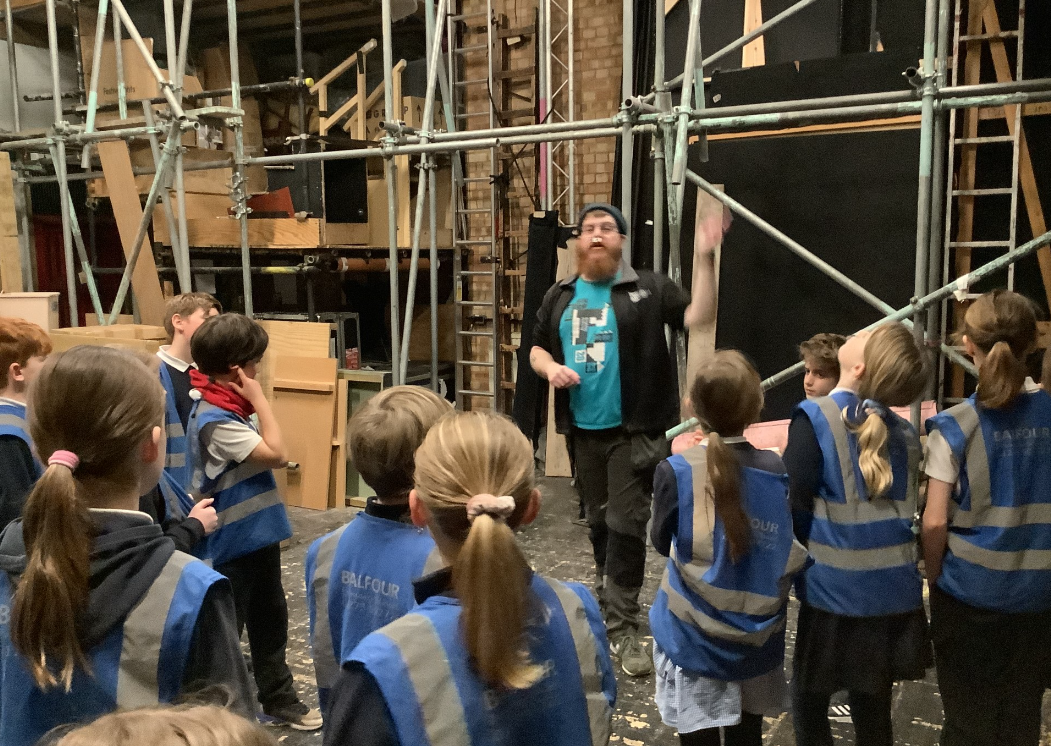
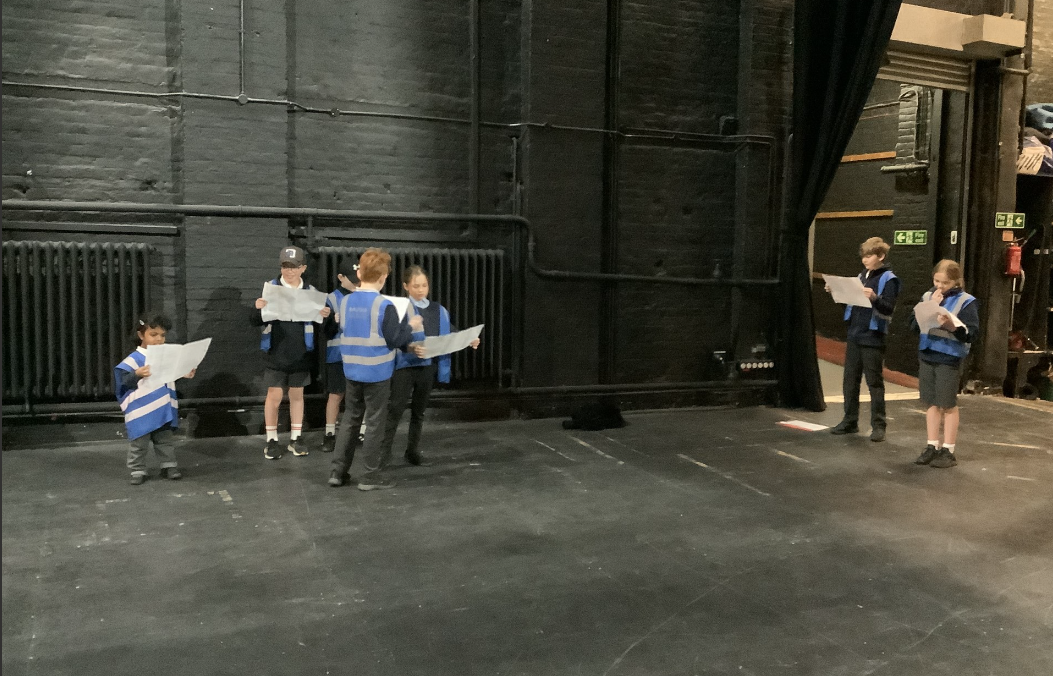
English: This week, we have been preparing for our class puppet show productions of ‘The Adventures of Odysseus’. The children have been editing, sharing and printing their scripts ready and have also made their own backdrops and lollystick figurines to act out their pair-written chapters.
We have also visited Theatre Royal to learn about modern day plays and the legacy that they originated from in Ancient Greece. The children were able to perform on stage, tour the building and have a look at what happens back stage.
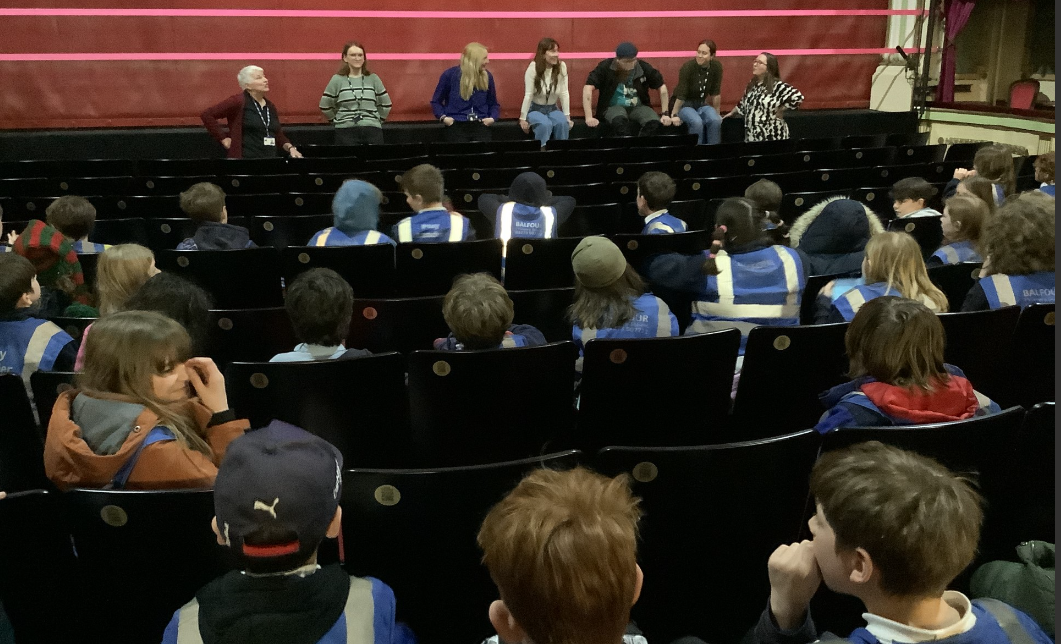
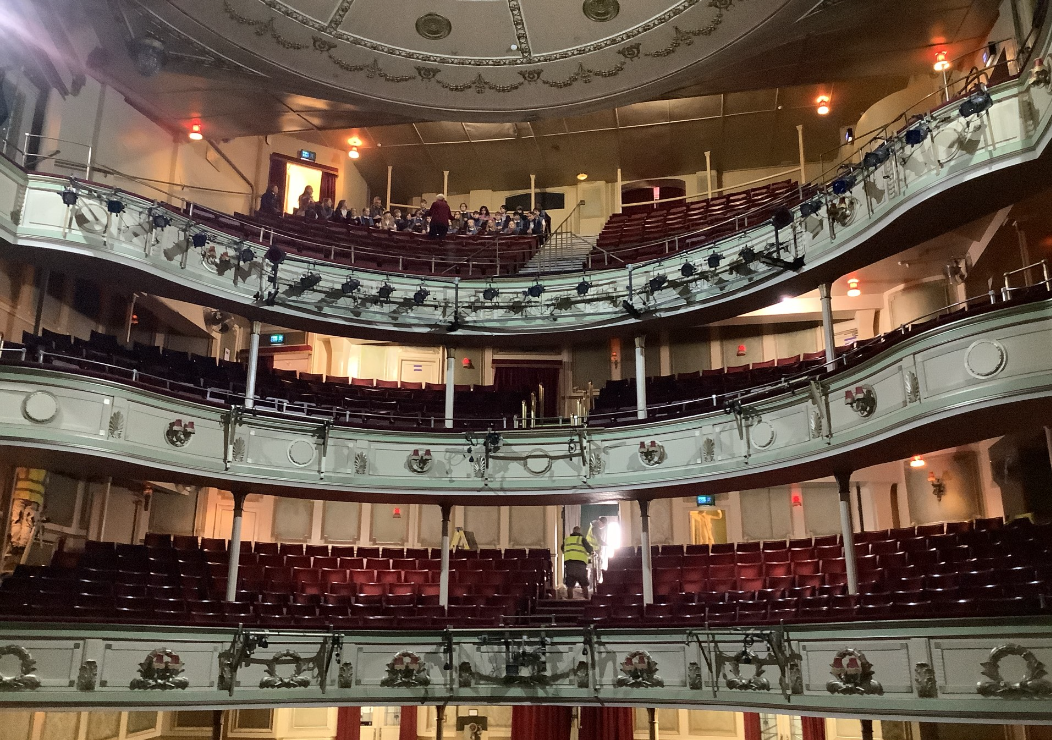

At home: Next half term, we are looking at a classic text. What does a classic mean?
Maths: We have been learning this week all about composite, square and prime numbers within our larger unit of factors and multiples.
At home: Please continue to practise TTRockstars at home –knowing timestable facts and their related division facts as we are using this knowledge to help us find factors, multiples and primes etc.
Spring 2, Week 5
English: This week, we have finished ‘The Adventures of Odysseus’ and have allocated learning partners a chapter each to begin to playscript ready for a lollystick puppet show next week as well as our trip to Theatre Royal on Wednesday, which is World National Theatre Day.
At home: What kind of images would go on a back drop?
Maths: We have finished our learning on volume this week and have begun focusing on factors, multiples and primes.
At home: Please continue to practise TTRockstars at home –knowing timestable facts and their related division facts as we are using this knowledge to help us find factors, multiples and primes.
Science: We finished off science week with a trip to Brighton Girls on Monday to take part in the fully funded science day. The children were able to enjoy the solar system and more in the Wonderdome, have a go at coding ‘Mars Rover buggies’ and enjoyed cookies and juice whilst watching an amazing video about space and a Brighton Girls Alum who now works for the European Space Agency.
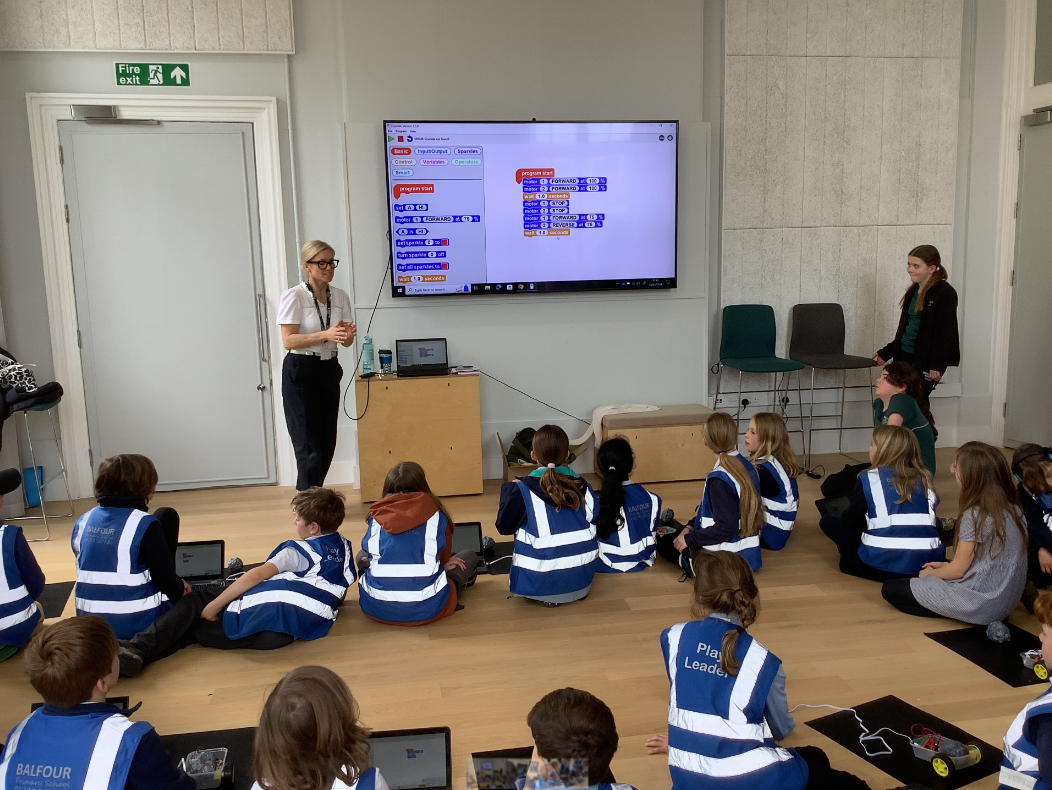
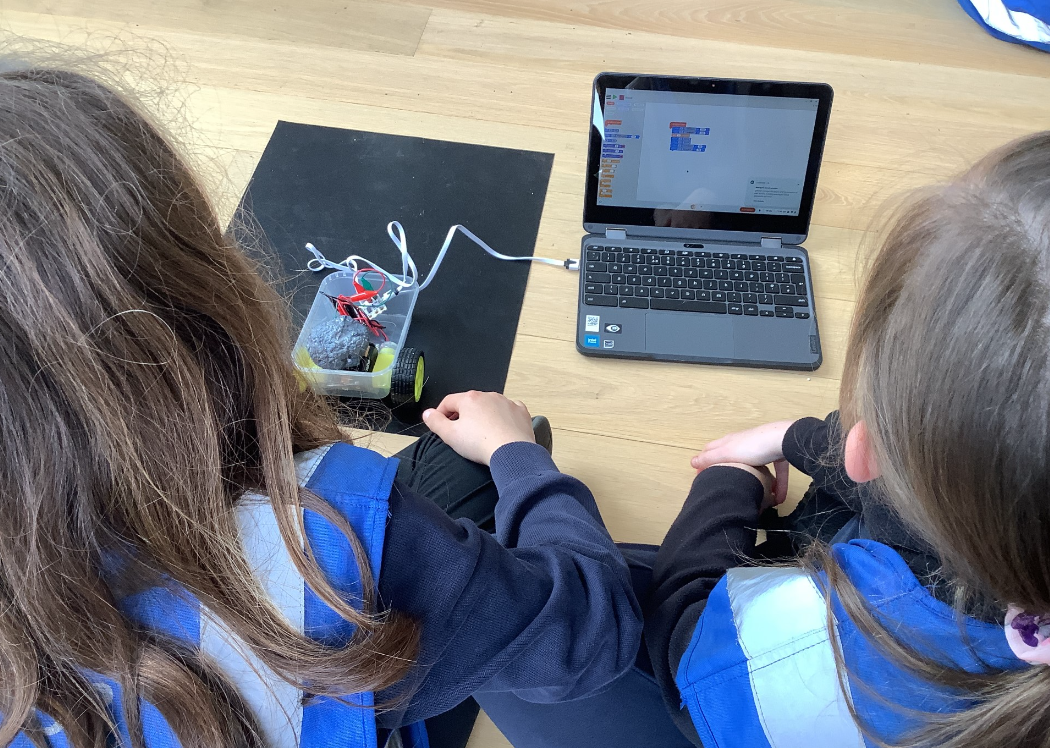
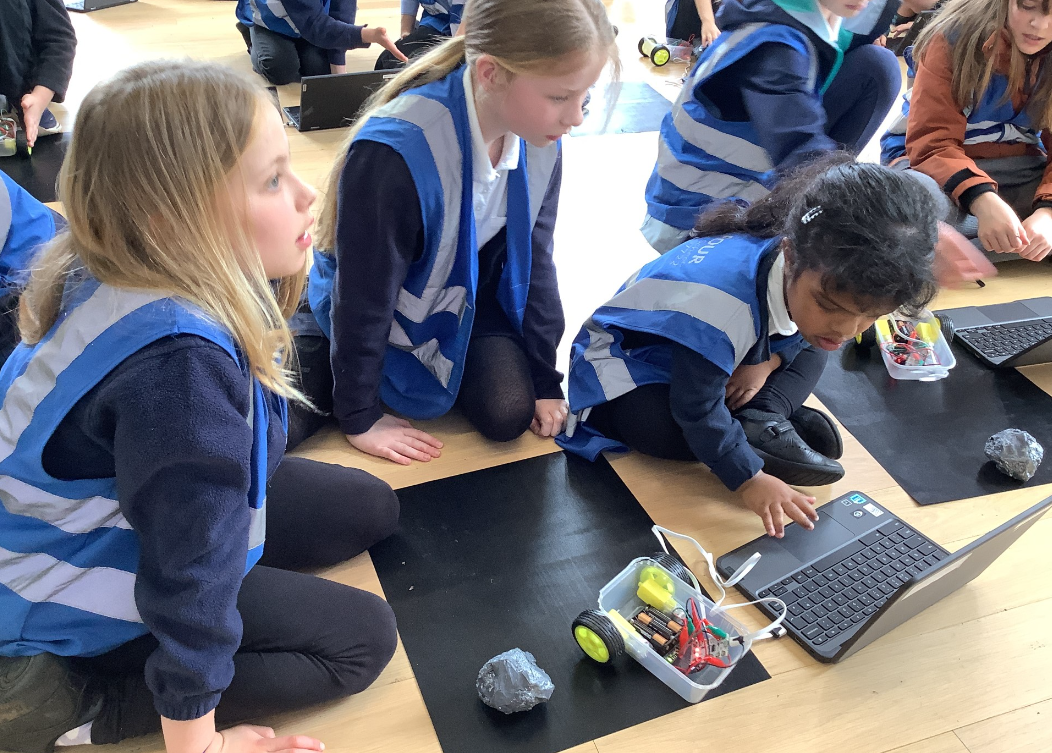
Spring 2, Week 4
English: This week, we have finished, edited and published our letters to Penelope explaining our (Odysseus’s) long journey home to Ithaca following the Trojan War. We have also re-started our play scripts unit in preparation for our celebratory puppet show at the end of this half term.
At home: What kind of images would go on a back drop?
Maths: We have been completing maths tests this week so will return to our regular maths lessons next week
At home: Please continue to practise TTRockstars at home –knowing timestable facts and their related division facts as we are using this knowledge to help us find the volume of cubes and cuboids.
Science: It’s science week! The children have been designing farms of the future, coding on Scratch to become time travellers and have learnt about and attempted to use sun dials to tell the time, which hasn’t gone very well with out very British, cloudy week! We’ve also completed a mission to Mars using the Now press Play Headsets and are looking forwards to our space trip at Brighton Girls this coming Monday.
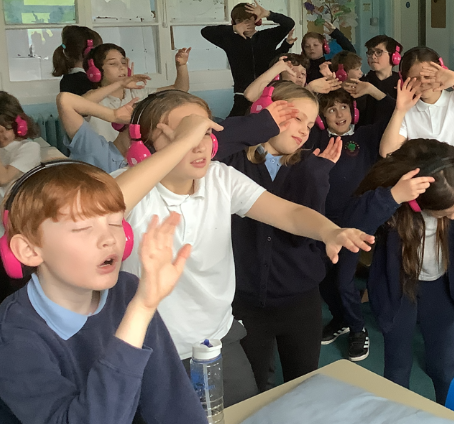
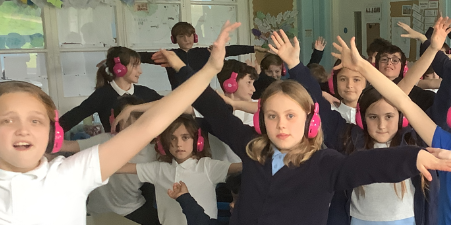
History: We’ve had Rainbow Theatre in to enrich our learning on Ancient Greece. All the children were involved in a drama production of the best myths and aspects of Ancient Greek history.
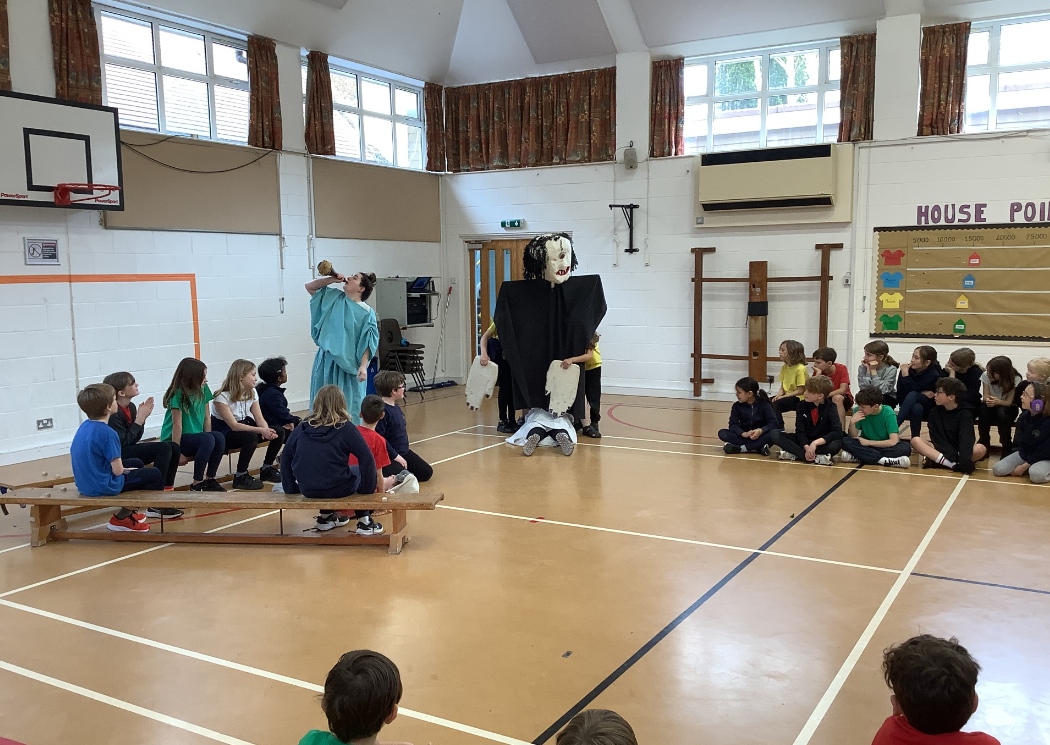
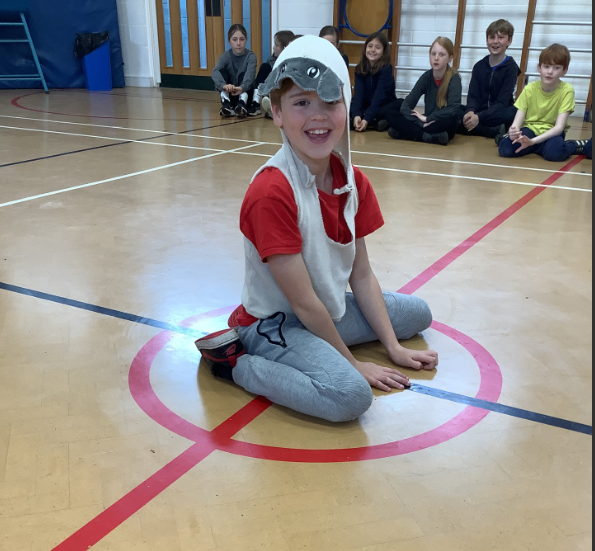
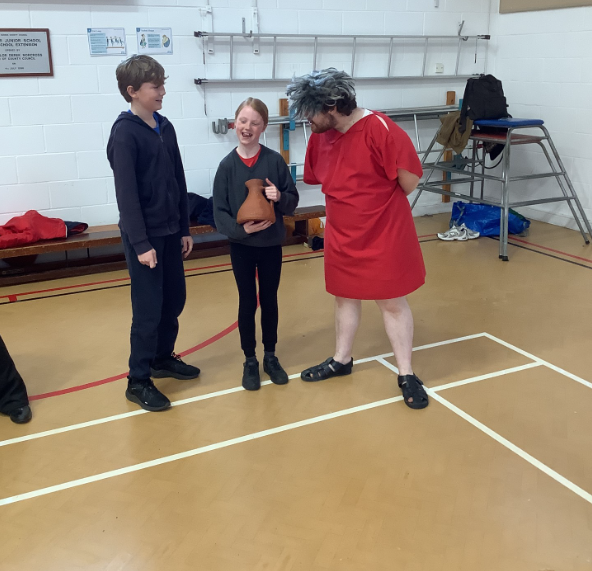
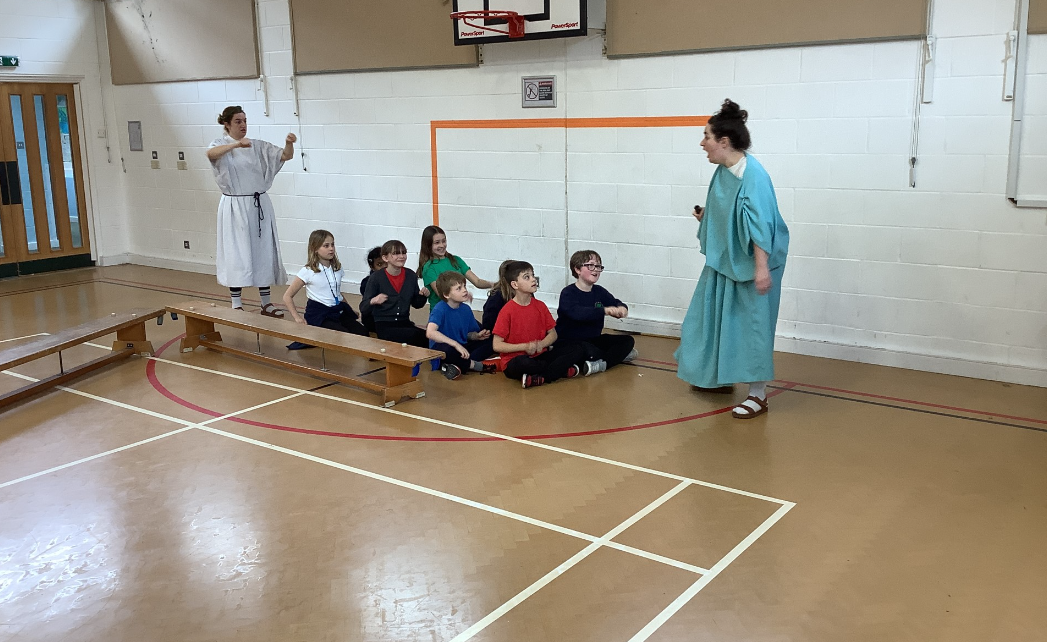
Spring 2, Week 3
English: This week, we have been learning about and practising modal verbs before planning and beginning our letter to Penelope from Odysseus explaining why he has been away from home for so long following the victory at Troy.
At home: How would you use origami to make an envelope?
Maths: We have been started a new unit and have been learning about volume (finding the space taken up by a 3D shape).
At home: Please continue to practise TTRockstars at home –knowing timestable facts and their related division facts as we are using this knowledge to help us find the volume of cubes and cuboids.
History: We learnt about the legacy of the Olympics this week and have had a visitor in to talk to the children about what the Olympics are like nowadays compared to what they were like in Ancient Greece.
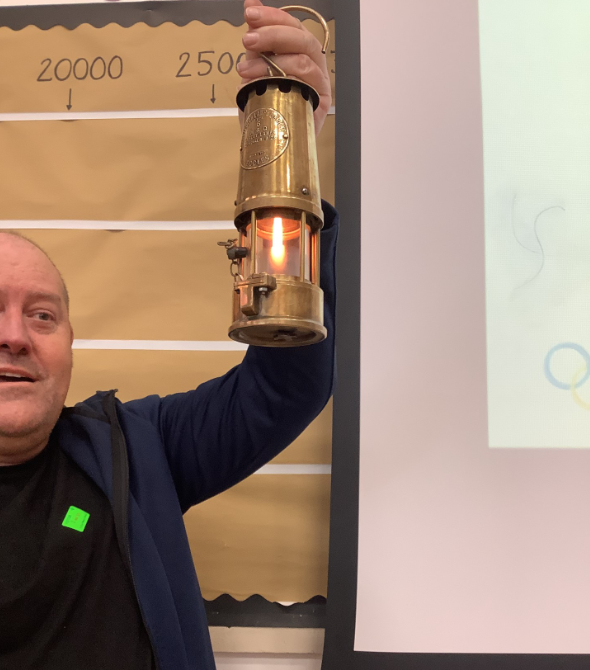
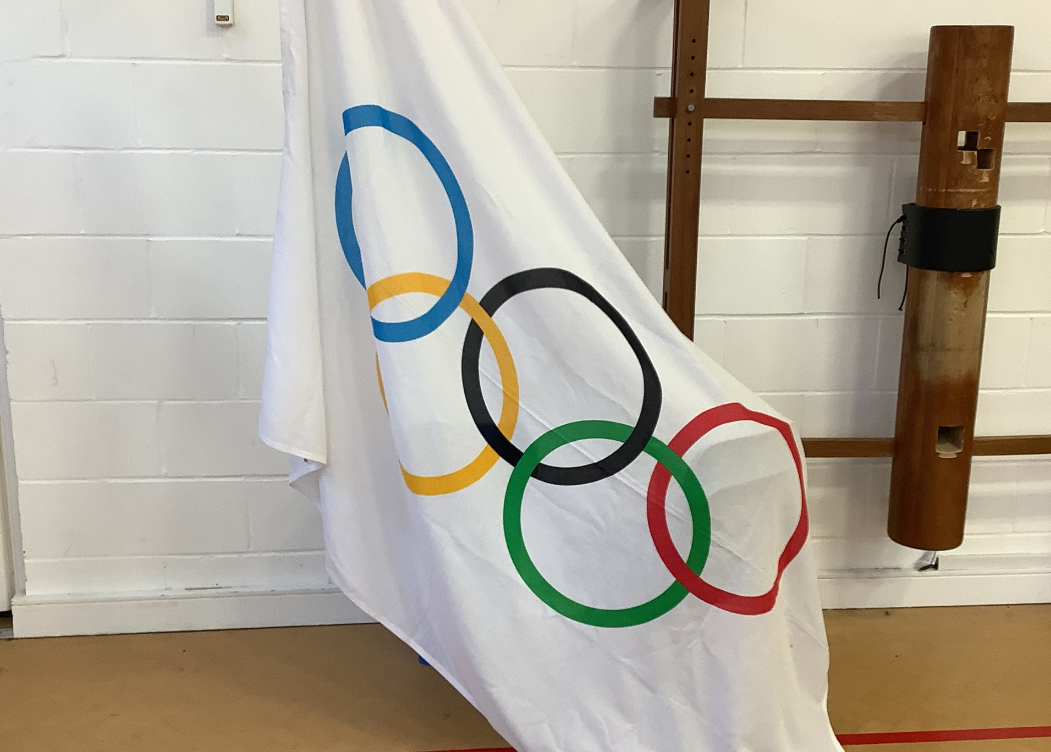

Spring 2, Week 2
English: This week, we have been drawing maps in groups to ensure we are confident in retelling Odysseus’s long journey home to Ithaca. We have been practising the skills needed to write an informal letter and will be planning and writing a letter to his wife Penelope next week.
At home: How would you use origami to make an envelope?
Maths: We have been continuing our learning on decimal fractions and have been looking at how dividing by 10 and 100 is the same and multiplying by 0.1 (a tenth) and 0.01 (a hundredth).
At home: Please continue to practise TTRockstars at home –knowing timestable facts and their related division facts as we are using this knowledge to help us multiply and divide decimals.
RE: We are learning about the Easter story this half term in RE and the children have been watching videos, participating in NPP experiences and using bibles to compare different version of the same event.
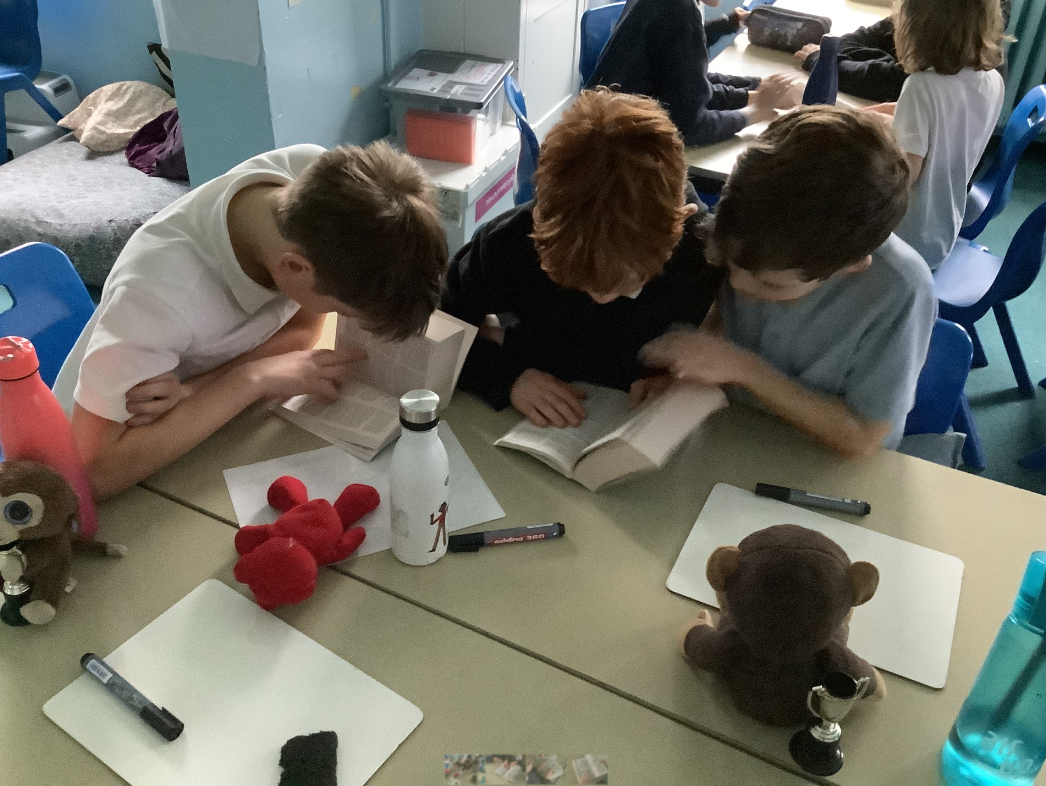
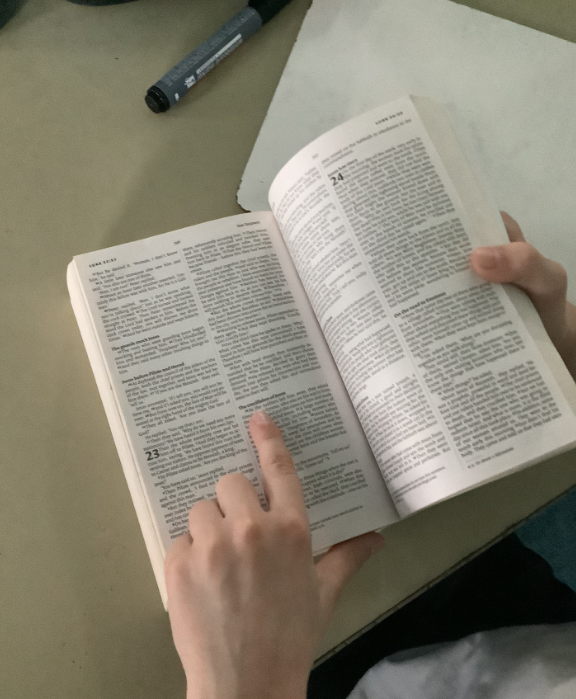
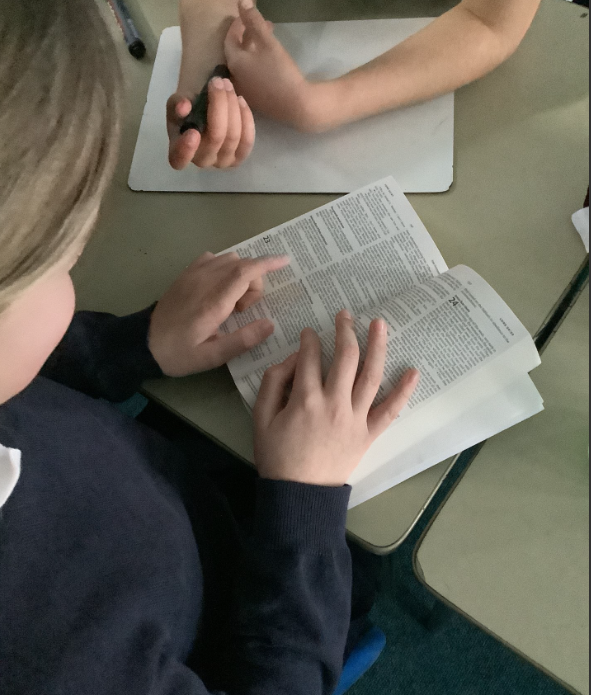
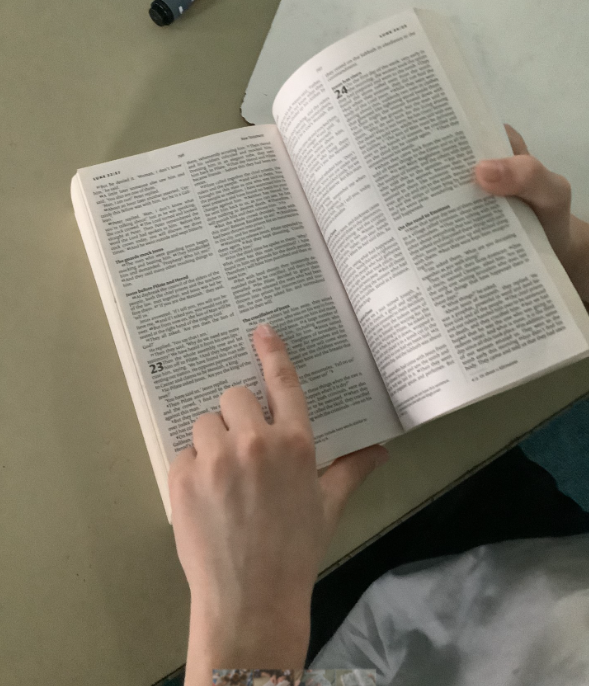
Spring 2, Week 1
English: This week, the children have been looking at formal and informal letters and comparing the differences between the types of language and sentences used.
At home: Can you find examples of formal and informal writing at home?
Maths: We have been continuing our learning looking at multiplying and dividing by 10, 100 and 1000 but focusing on decimals.
At home: Please continue to practise TTRockstars at home –knowing timestable facts and their related division facts as we are using this knowledge to help us multiply and divide decimals.
Science: We started our new unit on Earth and space this week and have learnt lots of facts about the planets and sun in our solar system and displayed them using salt dough. All children have been given a moon diary to complete over the next 4 weeks and it is due in on Monday 25th March.
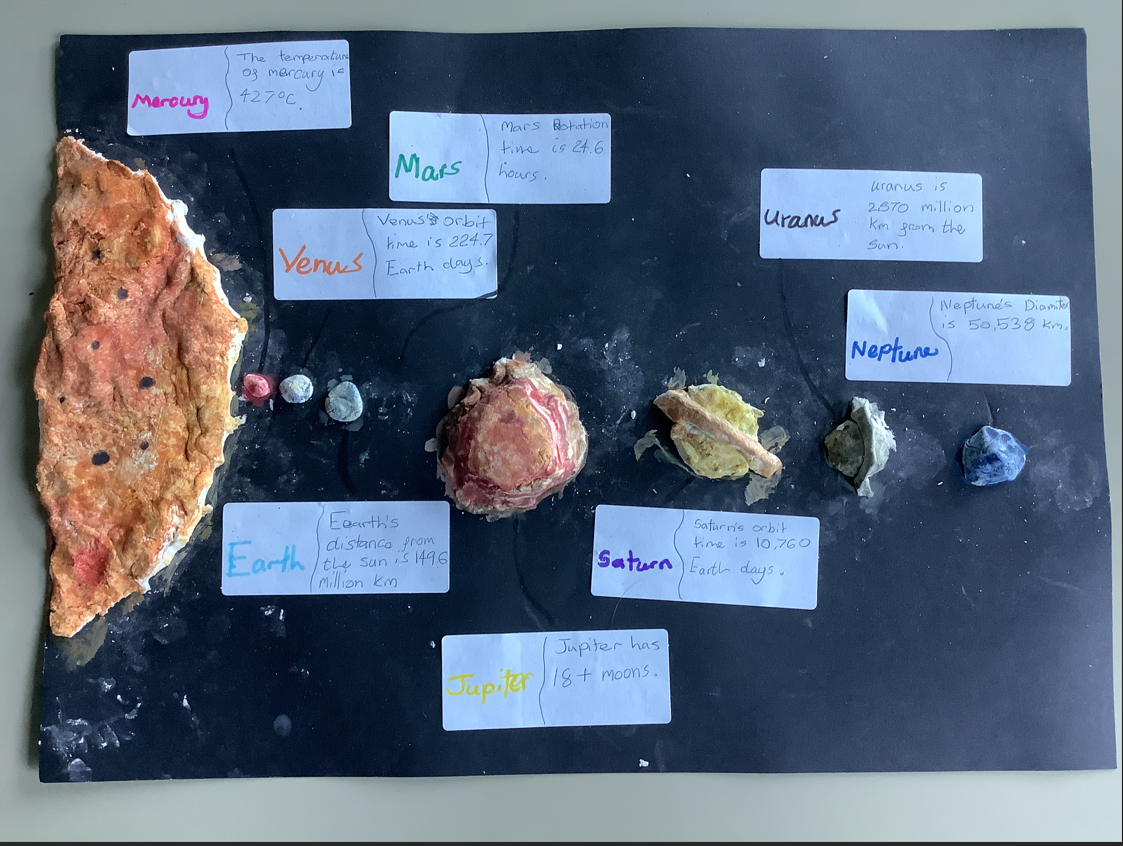
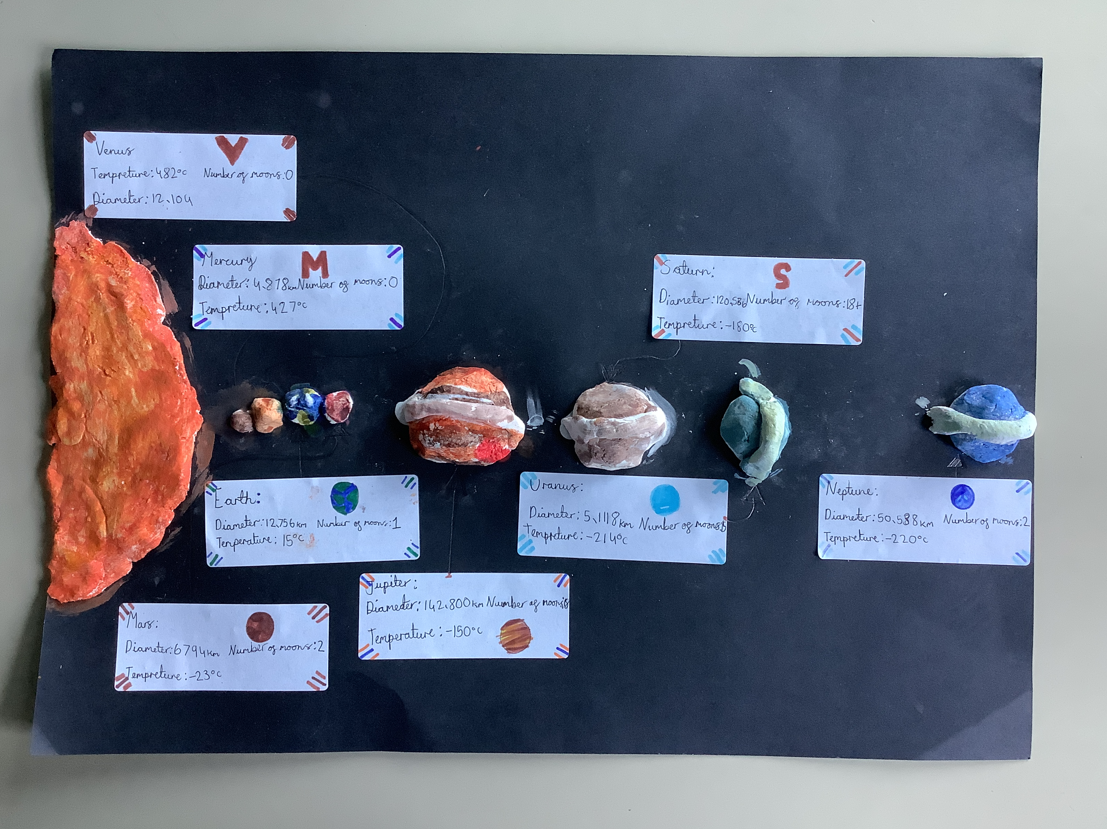
Spring 1, Week 6
English: This week, the children have been looking at formal and informal letters and comparing the differences between the types of language and sentences used.
At home: Can you find examples of formal and informal writing at home?
Maths: We have been continuing our learning looking at multiplying and dividing by 10, 100 and 1000 but focusing on decimals.
At home: Please continue to practise TTRockstars at home –knowing timestable facts and their related division facts as we are using this knowledge to help us multiply and divide decimals.
Science: We started our new unit on Earth and space this week and have learnt lots of facts about the planets and sun in our solar system and displayed them using salt dough. All children have been given a moon diary to complete over the next 4 weeks and it is due in on Monday 25th March.
Spring 1, week 5
DT: This week, we have been trying to protect the crown jewels by using Scratch and our homemade switches to code our Makey Makeys and create alarms.
English: This week, we have been continuing with list poetry and have been rehearsing all of the skills needed to write our own poems. The theme for these will be ‘your favourite place in the world’
At home: Think about where your favourite place in the world is – a holiday, your bed, a local place?
Maths: We have been continuing with our area and scaling unit. This week, we have been using our new knowledge of scaling to scale up ingredients for slime and then made a mess trying to make it!
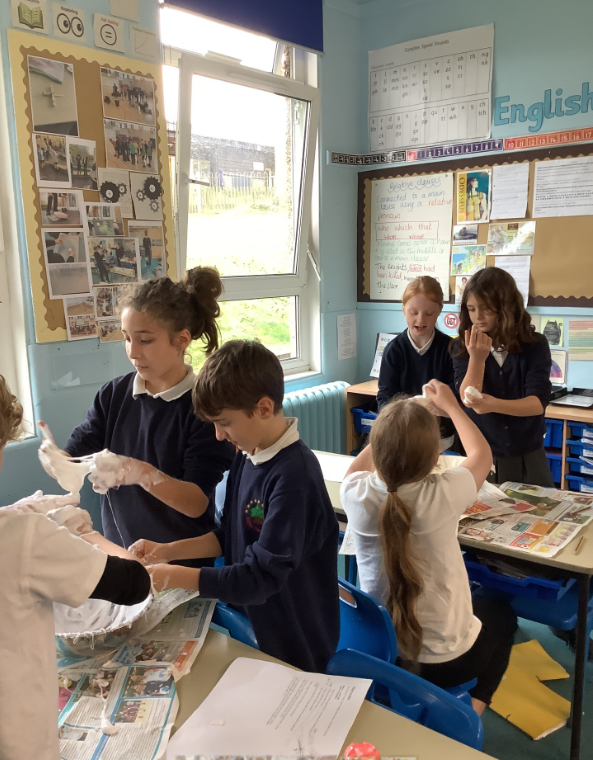

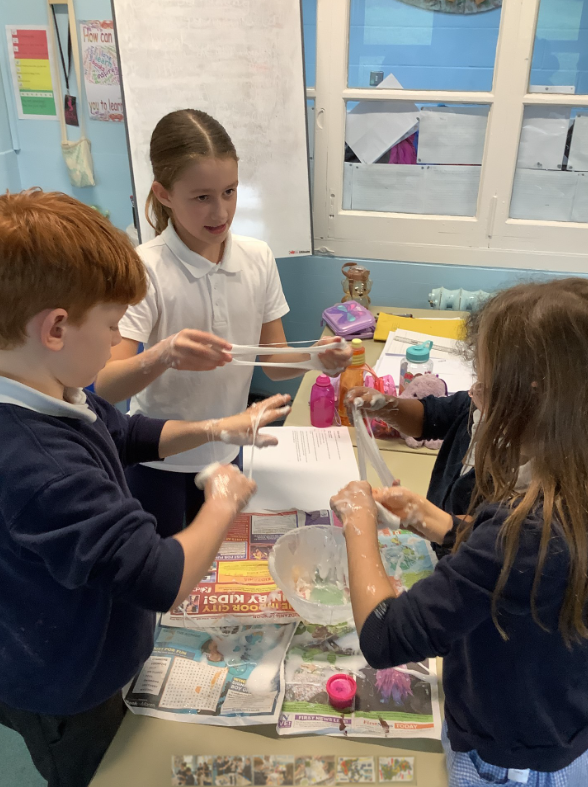
At home: Please continue to practise TTRockstars at home –knowing timestable facts and their related division facts as we are using multiplication and division to help us with scaling.
Geography: Last week, we have been comparing the physical (natural) geography of Greece to the UK and have been using salt dough to help us demonstrate the topography of both countries by creating 3D maps. This week, we are painting them and labelling both the human and physical geographical features to create a 3d infographic map.
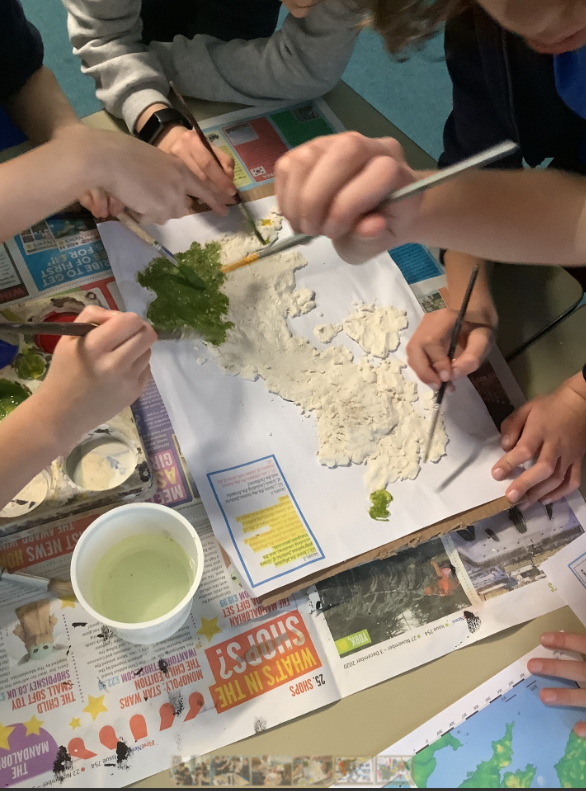
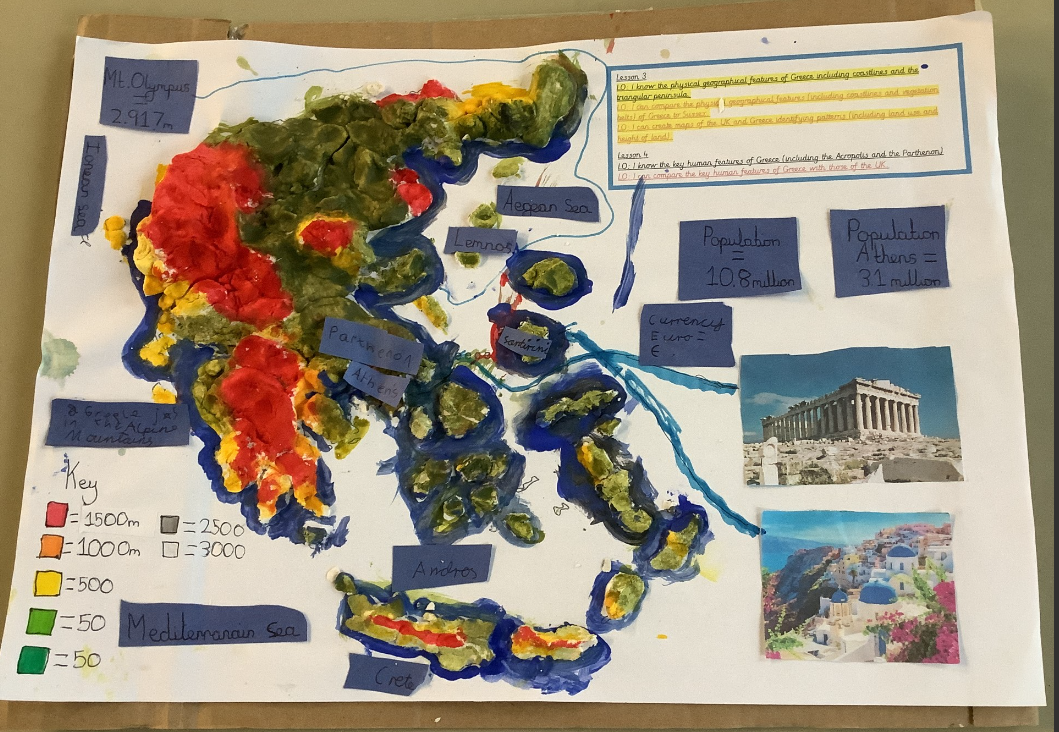
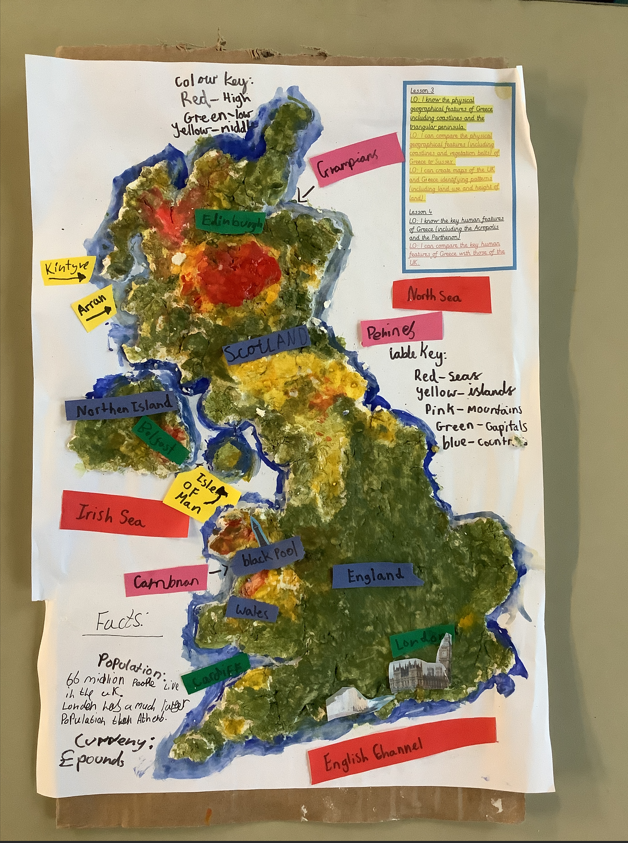
Spring 1, Week 4
English: This week, we have finished and published our descriptive settings and have been reading lots of ‘The Adventures of Odysseus’. We are now pausing the book and carrying on with it after half term so we can focus on our new unit – list poetry.
At home: Think about where your favourite place in the world is – a holiday, your bed, a local place?
Maths: We have been continuing with our area and scaling unit. This week, we have been using our new knowledge of how to find the area of a square and rectangle to help us find the area of compound, rectilinear shapes (shapes that are made up of straight lines and either 90 or 270 degree angles).
At home: Please continue to practise TTRockstars at home –knowing timestable facts and their related division facts as we are using multiplication to work out the area of rectilinear and compound shapes.
Geography: This week, we have been comparing the physical (natural) geography of Greece to the UK and have been using salt dough to help us demonstrate the topography of both countries by creating 3D maps.
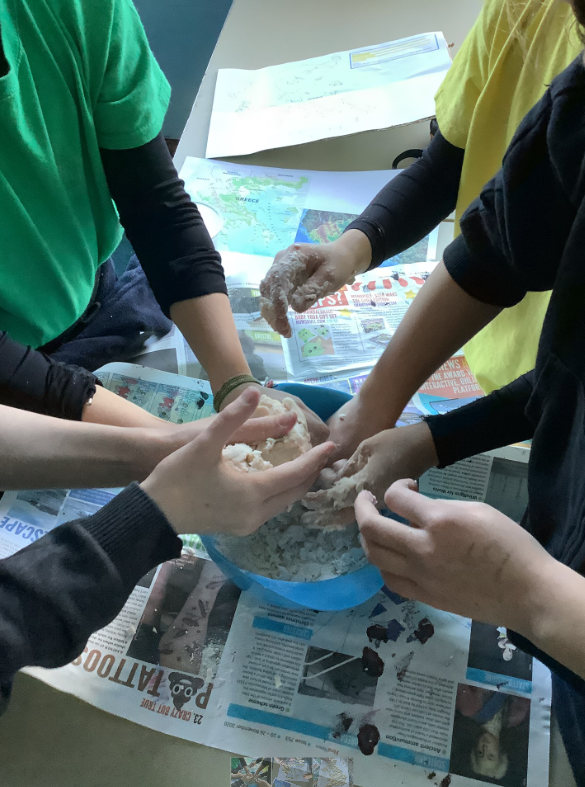
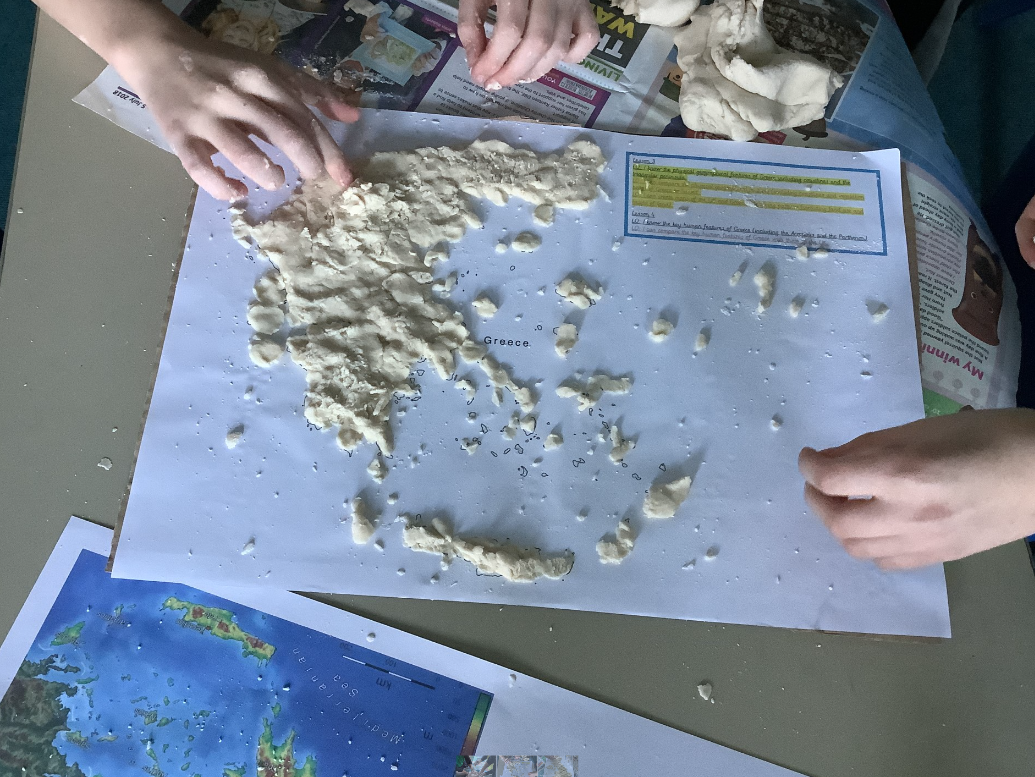
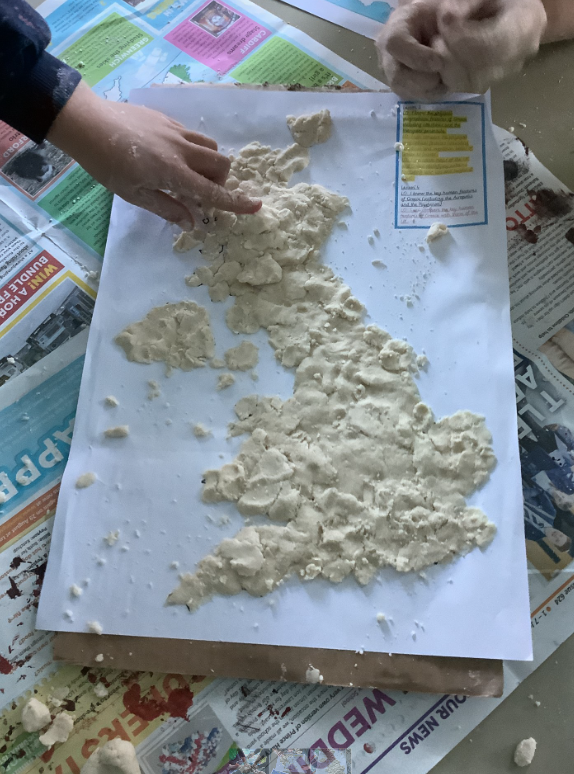
Spring 1, Week 3
English: This week, we have been continuing with our learning around descriptive settings. We have finished rehearsing all of the skills needed to create imagery and have begun writing and editing.
At home: Think about a room in your house. How would you describe it to your learning partner using your senses and figurative language?
Maths: We have started a new unit on area and scaling. First, we revised our year 4 learning around perimeter and have now introduced the first part of the unit: area. This week, we have been using squares to help us find the area of shapes and draw shapes with a set area of cm2.
At home: Please continue to practise TTRockstars at home –knowing timestable facts and their related division facts as we are using multiplication to work out the area of squares and rectangles.
RE: This week we are comparing different creation stories and the children have been using drama to show what they’ve learnt.
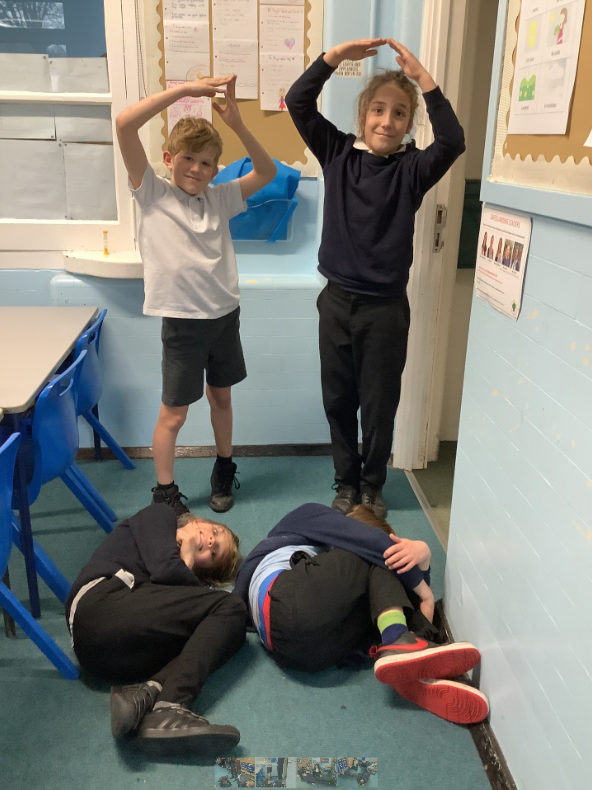
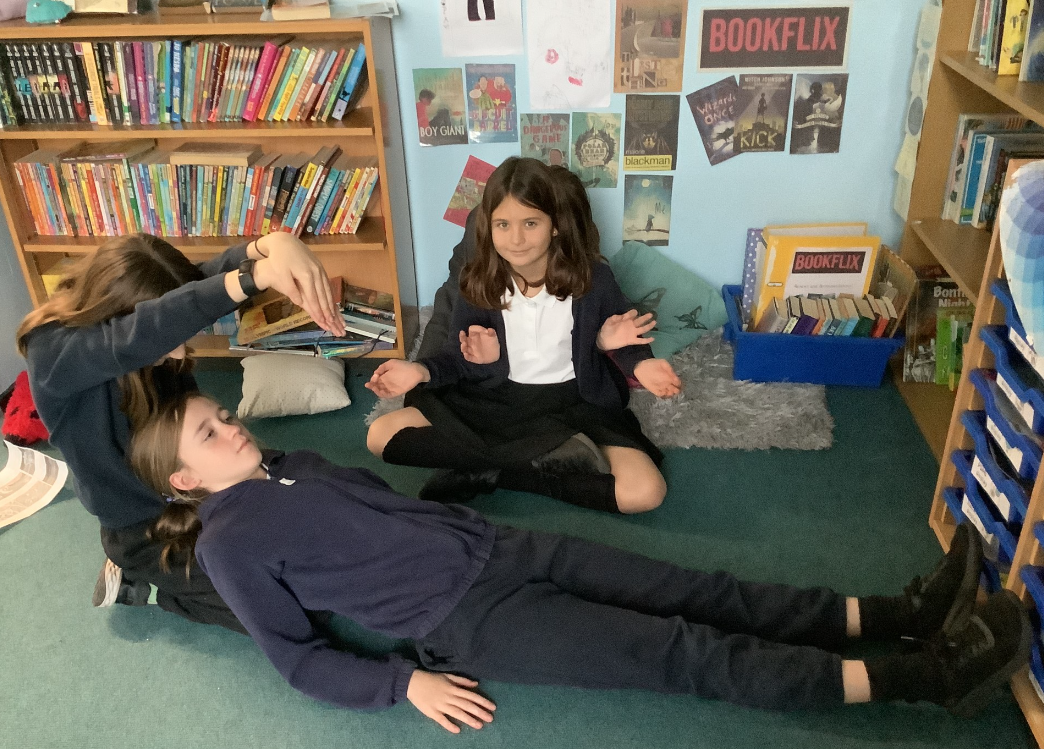
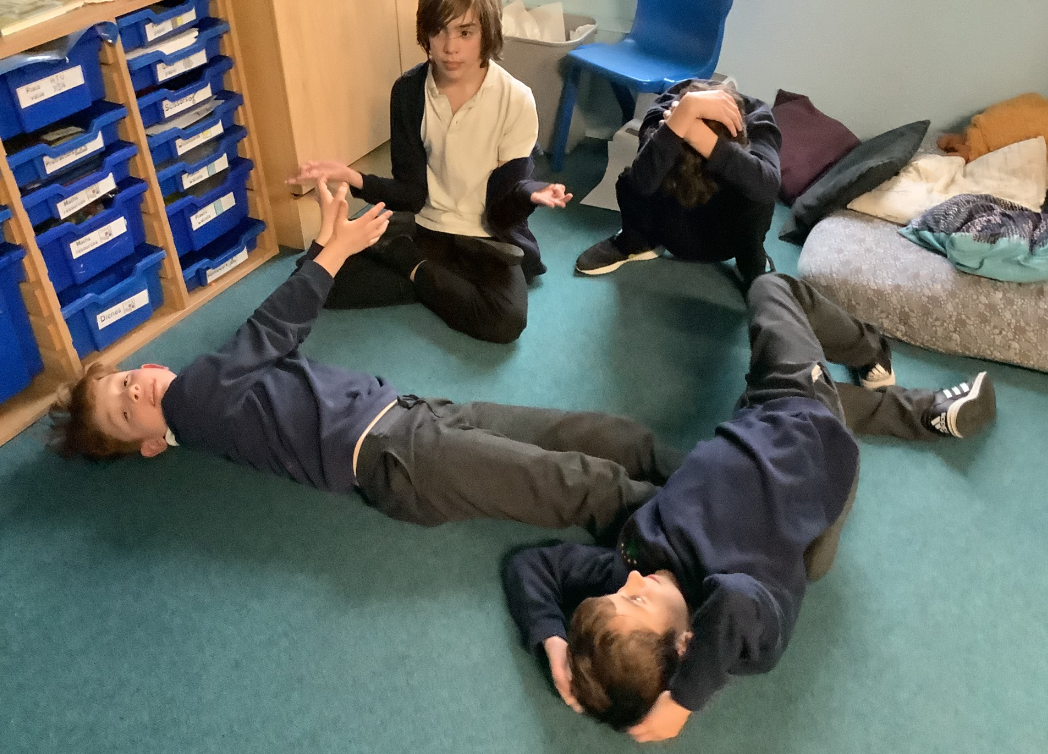
Spring 1, Week 2
English: This week, we have been continuing with our learning around descriptive settings. We have identified the steps to success for this genre and are now in our rehearsal stage of the writing process: revising expanded noun phrases and prepositional phrases.
At home: You could look at Where’s Wally pictures together and create descriptive phrases to support each other in finding the item or person you are describing.
Maths: We have been securing our knowledge of short division by re-capping diving 3-digit numbers by 1-digits numbers by solving problems and looking for patterns.
At home: Please continue to practise TTRockstars at home –knowing timestable facts and their related division facts means we can really focus on securing the process of short division.
PSHE: This half term, we are learning about ‘Good To Be Me’, which is focusing on celebrating our identities – our heritage, likes and dislikes, hobbies etc.
DT: We are learning about complex switches using the Makey-Makeys this half-term. This week, the children have been getting to grips with how to program and use them through playing with them and Scratch.
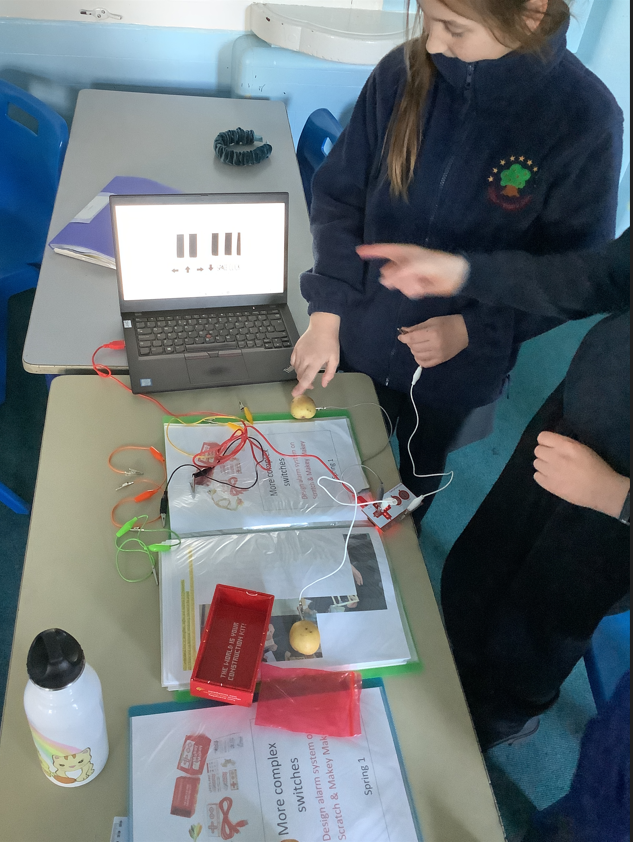
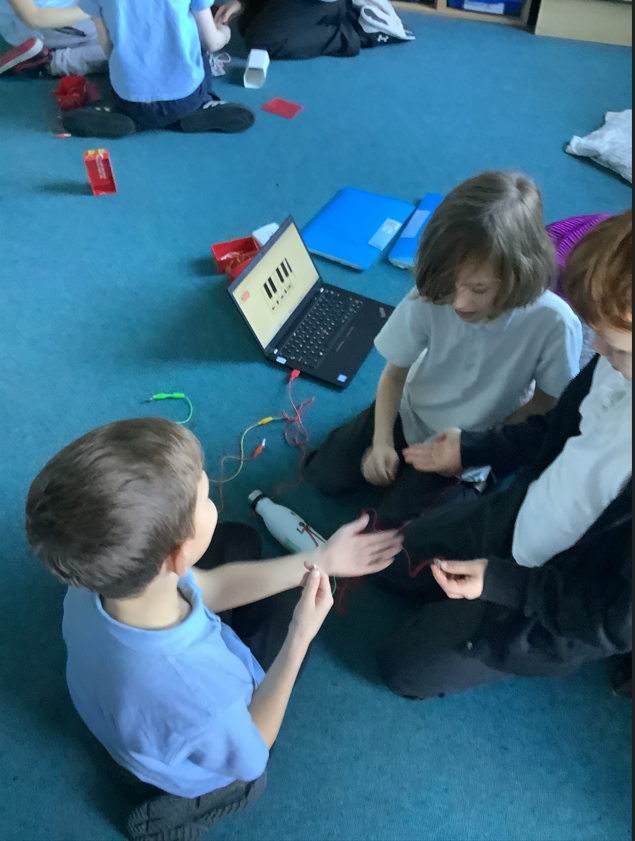
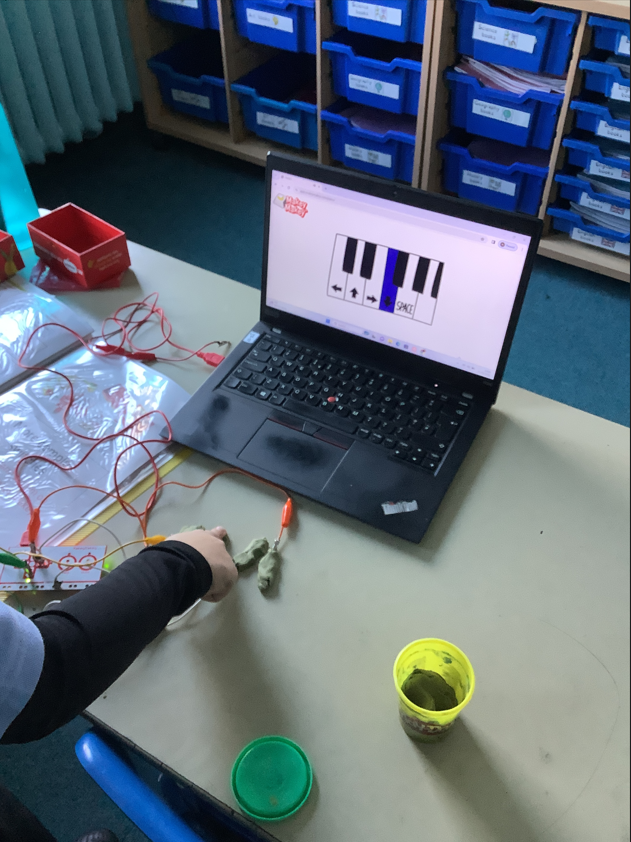
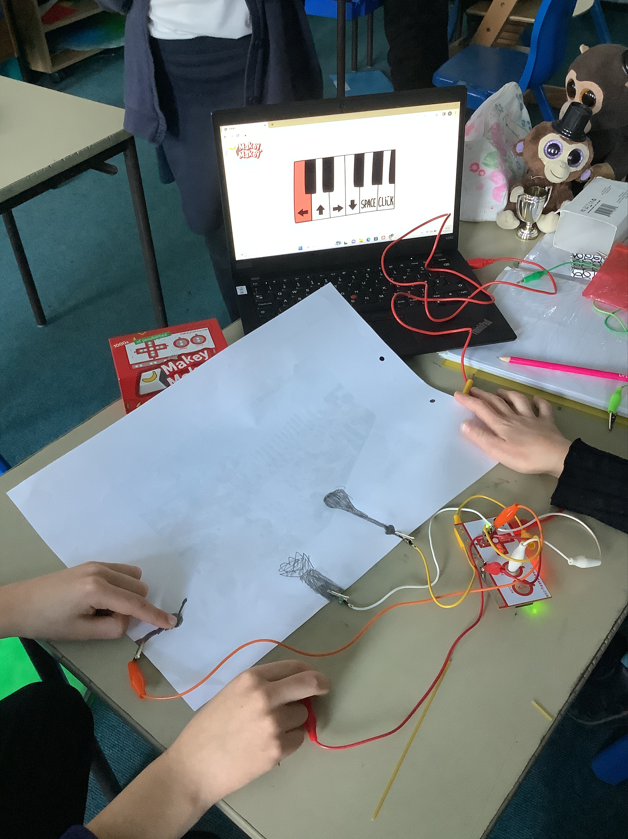
Spring 1, Week 1
English: This week, we have started our new class reader (The Adventure of Odysseus) and have been immersing ourselves in descriptive settings.
At home: You could watch Disney’s Hercules
Maths: We have been revising our short division and learning how to divide 3-digit numbers by 1-digit number looking at exchanging and remainders.
At home: Please continue to practise TTRockstars at home –knowing timestable facts and their related division facts means we can really focus on securing the process of short division.
PE: This half term, we are doing gymnastics and tennis. It is going to be particularly cold whilst outside doing tennis so please ensure your children wrap up warm (and for nature school too).
Autumn 2, Week 7
English: This week, we have been writing our own non-chronological reports about the Normans and publishing them for a class book.
At home: You could read some information books.
Maths: We have been starting to learn short division, beginning with dividing 2 digit numbers by 1 digit numbers.
At home: You could practise the method. Also, you could practise your times tables on TTRS to help you.
Christmas: we enjoyed our Christmas lunch on Wednesday and loved taking part in Christmas activities including a silent disco and crafts.
Autumn 2, Week 6
English: This week, we have been developing our skills in punctuation, using colons and parenthesis, and starting to plan our own non-chronological reports about the Normans.
At home: You could look for examples of colons, brackets, dashes and commas when you are reading.
Maths: We have been practising our short multiplication method and using it to solve problems.
At home: You could practise the method. Also, you could practise your times tables on TTRS to help you.
Music: We have performed our Christmas concert – thank you to all the families who were able to come and watch us!
DT: some classes have been creating structures using hacksaws and glue guns. Here are some of our creations!

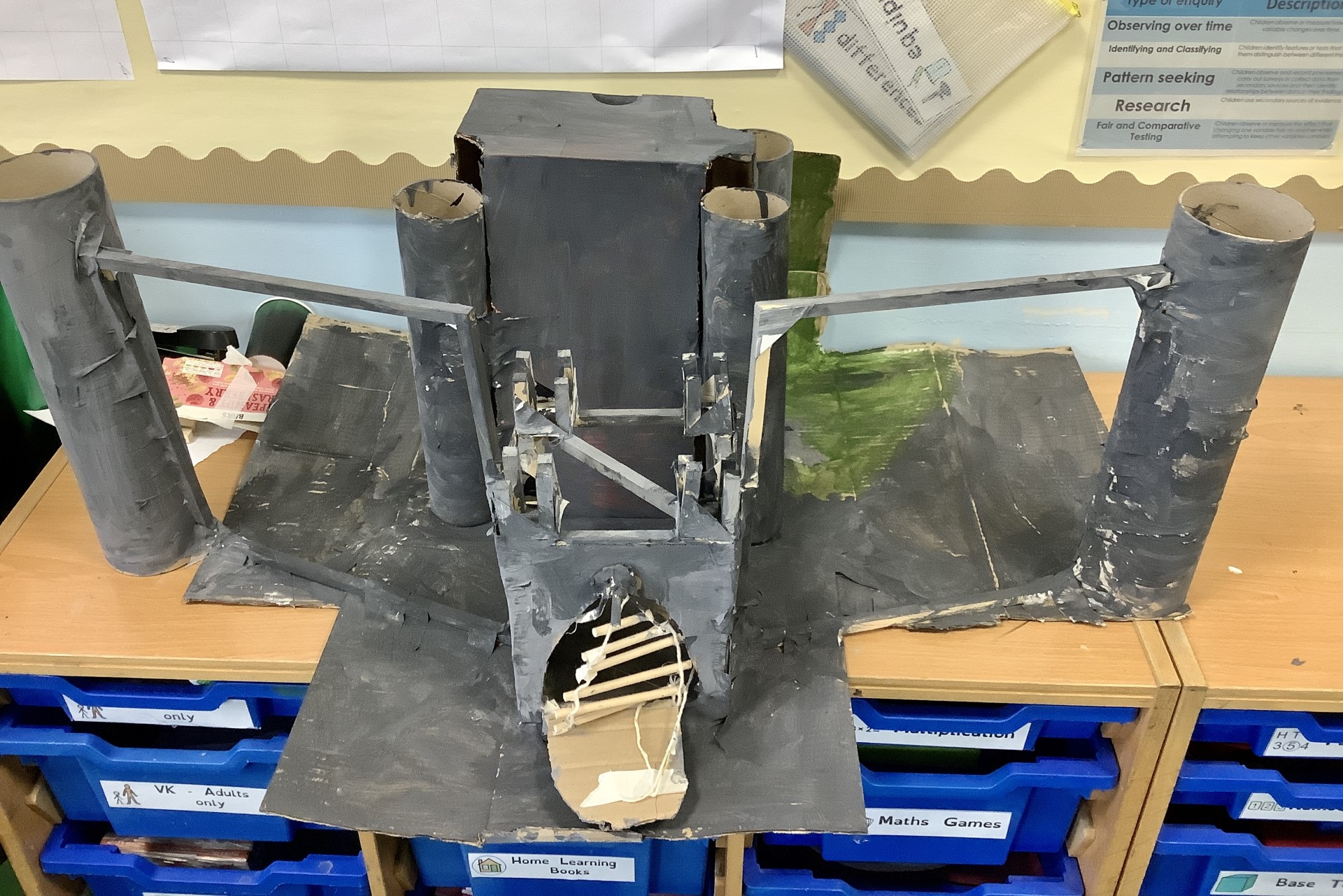
Autumn 2, Week 5
English: This week, we have been starting our learning about non-chronological reports. We have been exploring the key features and ‘speaking like an expert’ to develop our technical language skills.
At home: You could look at books or other texts at home to look for information texts on various subjects.
Maths: We have been learning to multiply one digit numbers by 2 or 3 digit numbers using short multiplication.
At home: You could practise the method. Also, you could practise your times tables on TTRS to help you.
Music: We have been continuing to learn songs for our Christmas concerts.
At home: learn the words for the concert which have been sent home this week.
Environment: we had a great visit from Sustrans who promote sustainable travel. They helped us to learn some new skills on our bikes.
DT: some classes have been creating structures using hacksaws and glue guns. Here are some of our creations!


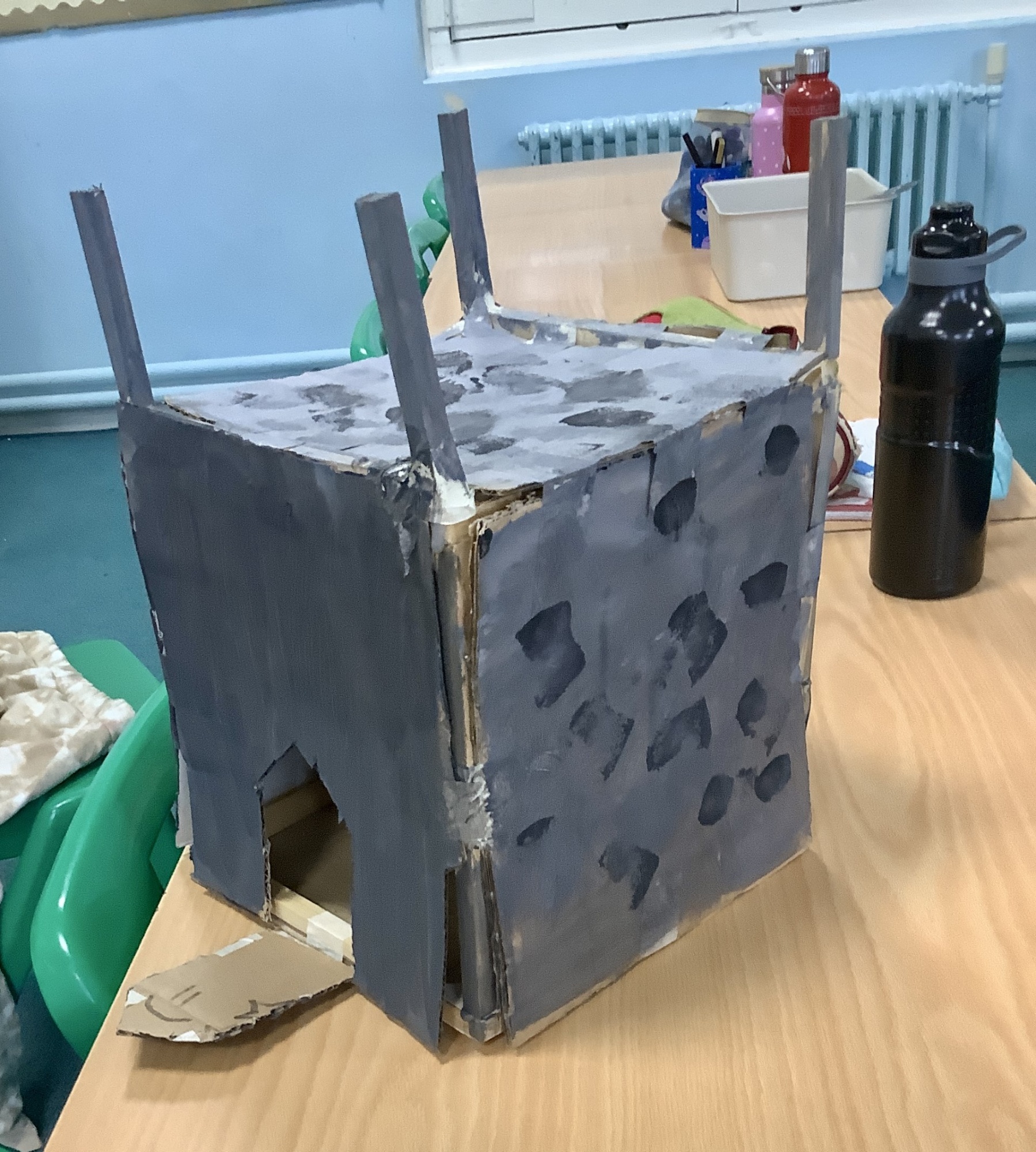
Autumn 2, Week 4
English: This week, we have been writing explanation texts about our designs which could attack a castle.
At home: You could look examine other explanation texts – where can you find them?
Maths: We have begun our unit about multiplication and have started to think about formal written methods.
At home: You could practise the method. Also, you could practise your times tables on TTRS to help you.
Music: We have been continuing to learn songs for our Christmas concerts.
At home: learn the words for the concert which have been sent home this week.
Autumn 2, Week 3
English: This week, we have been finding out about explanation texts. We used junk modelling to create a machine which could attack a castle. Then, we gave oral presentations in the style of Dragon’s Den to explain how they worked. (See photos).
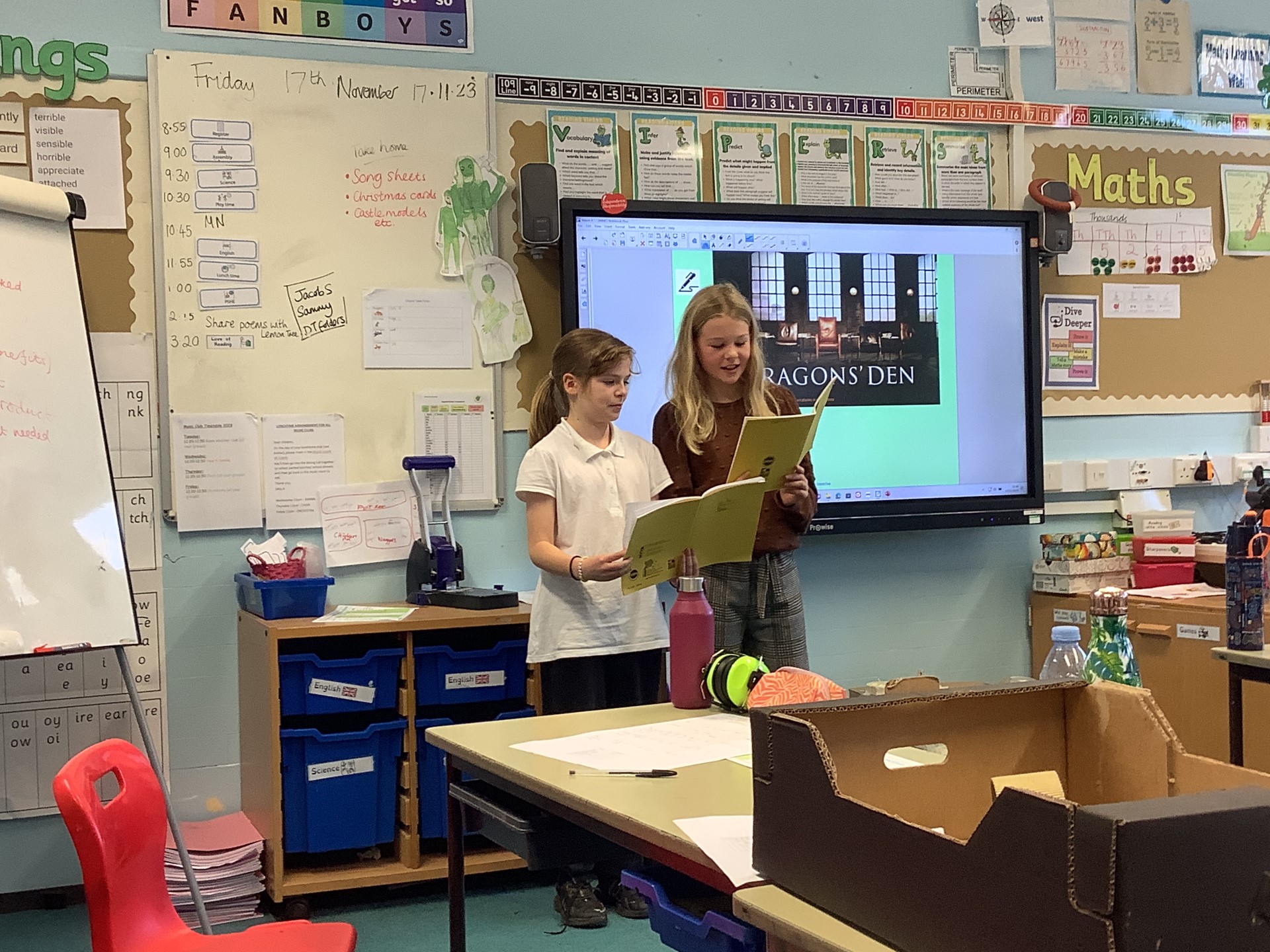
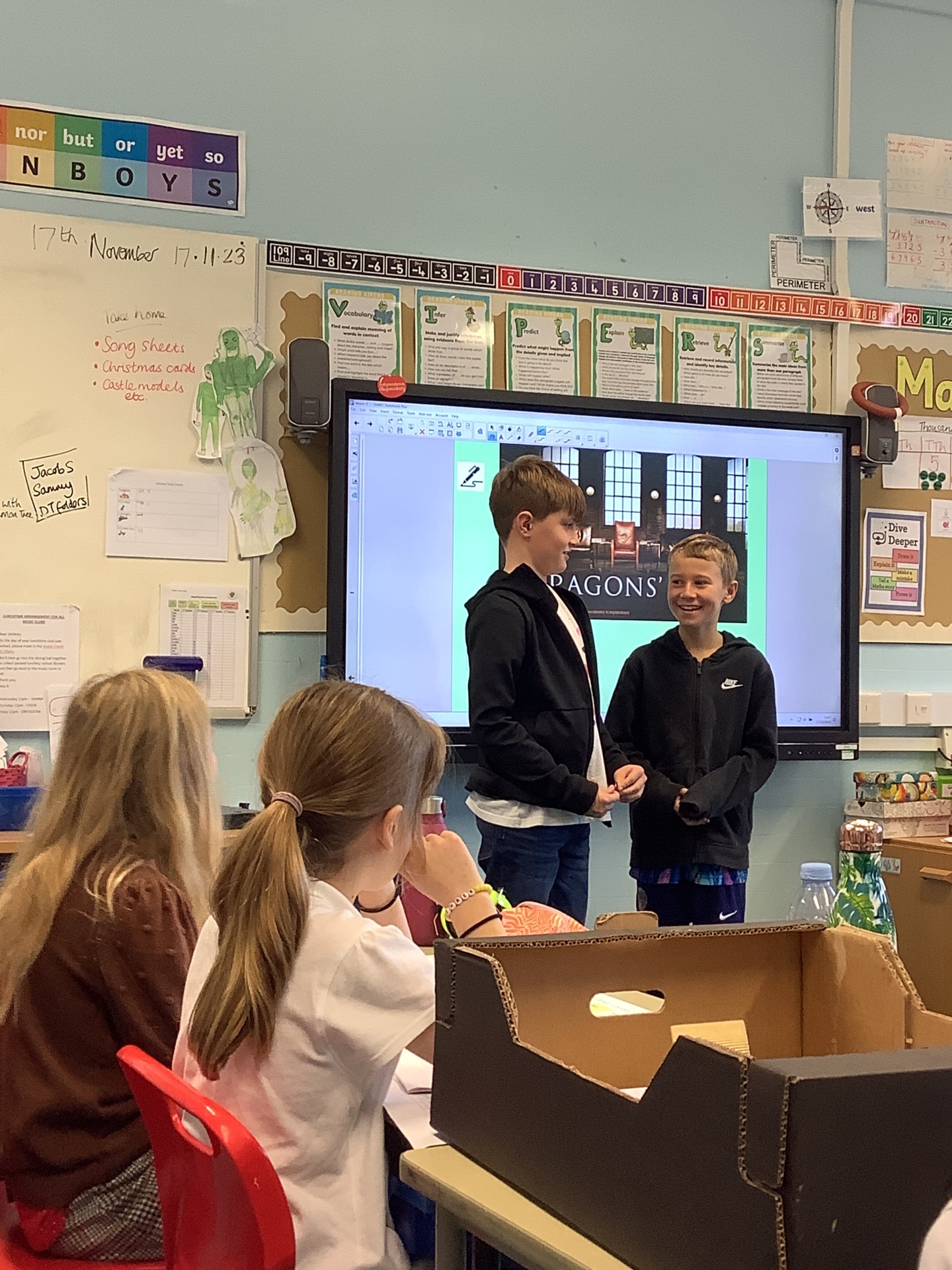

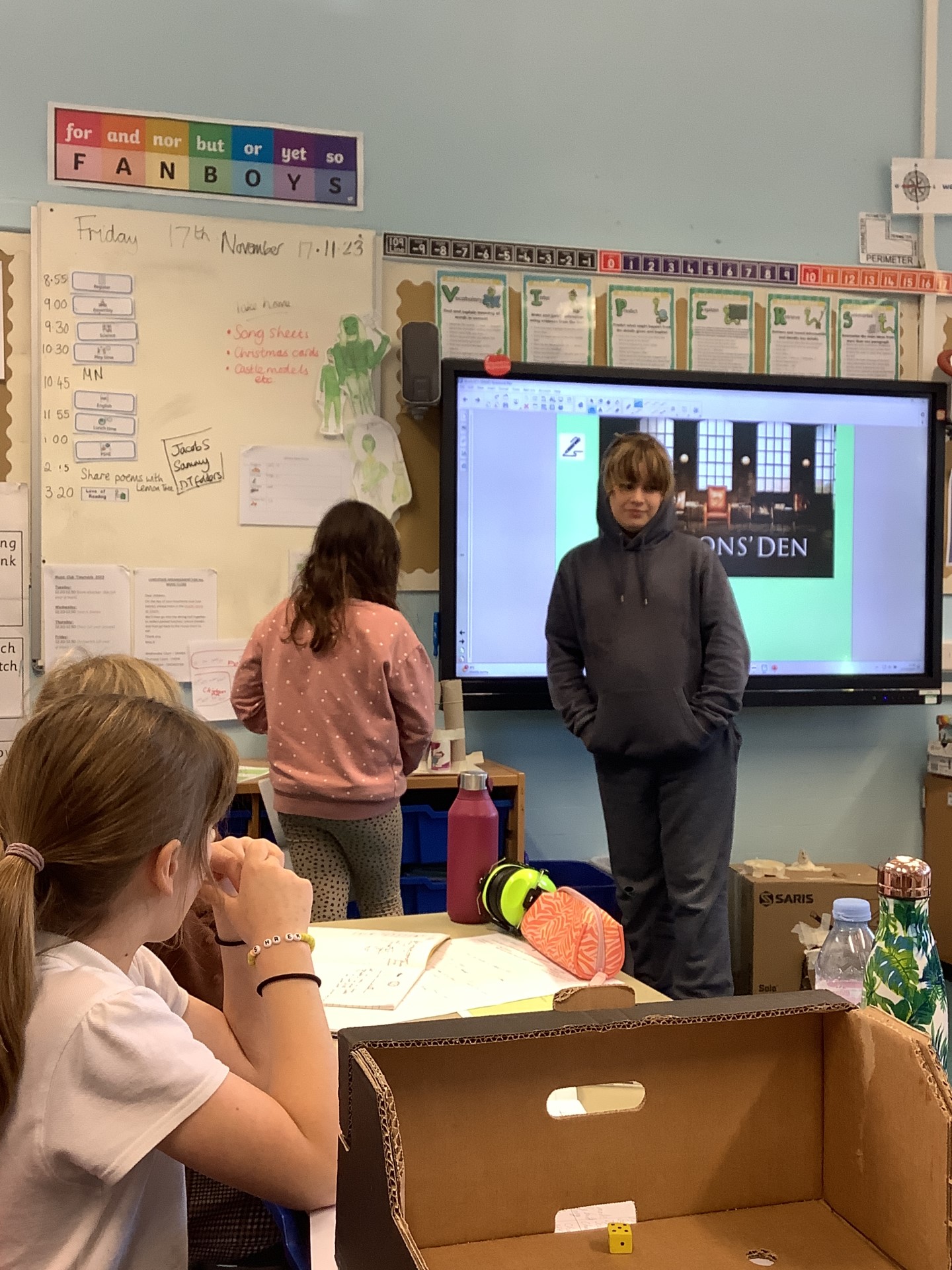
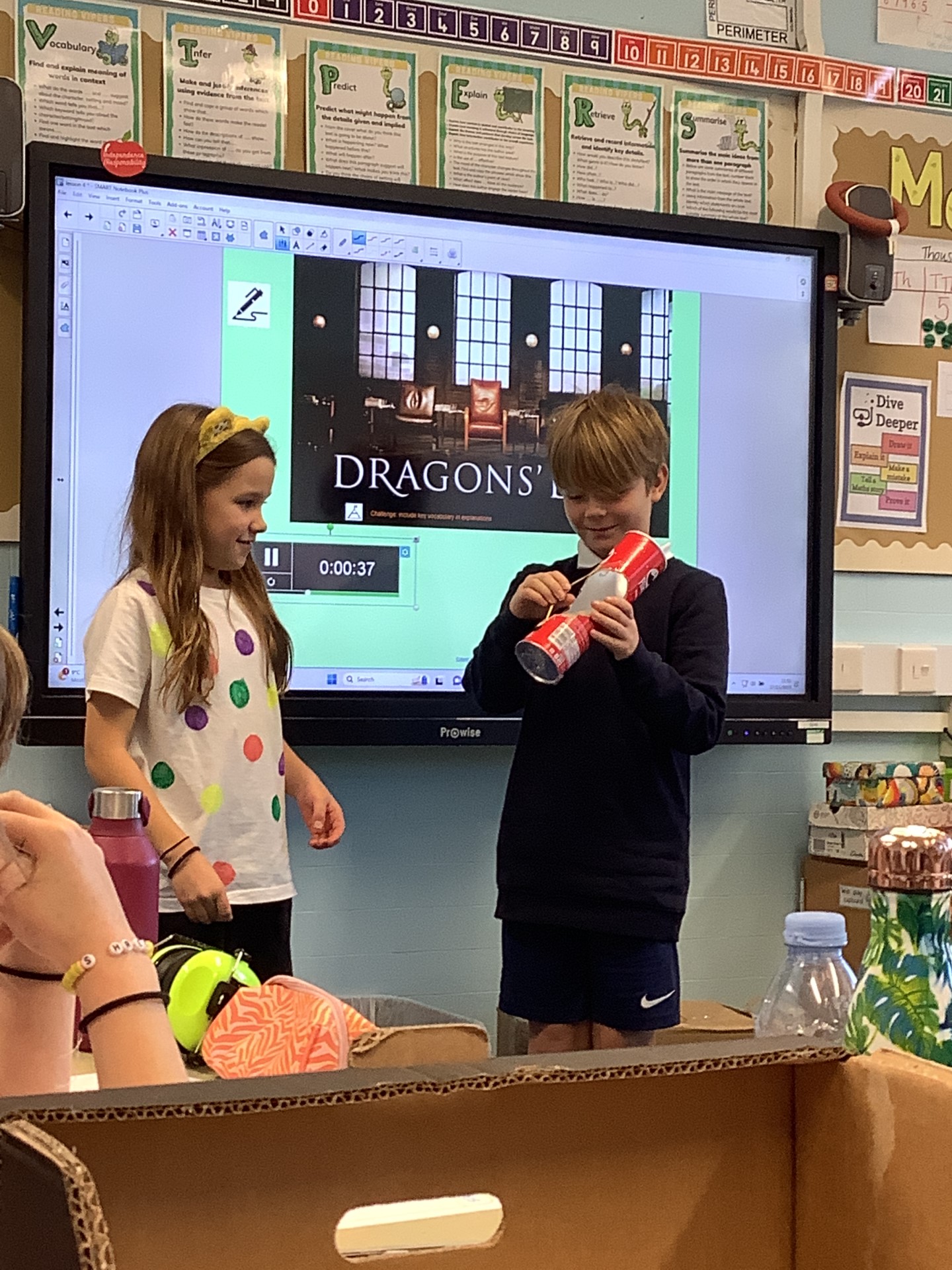
At home: You could look at books or other texts at home to look for explanation texts.
Maths: We have been continuing our learning about positive and negative numbers. We have found the difference between positive and negative numbers and solved lots of problems about them.
At home: You could talk to someone about positive and negative numbers in bank balances and what they mean.
Music: We have been starting to learn songs for our Christmas concerts.
At home: learn the words for the concert which have been sent home this week.
Autumn 2, Week 2
English: This week, we have finished writing our narrative poems linked to our story about Sir Gawain. We will be performing these to our buddy classes in Year 2 next week.
At home: You could practise reading aloud with expression and intonation. You could use a poem to practise reading with rhythm.
Maths: We have been learning about positive and negative numbers. We have been learning to read these numbers, place them on a number line and calculate the interval between two numbers.
At home: You could investigate temperature in different parts of the world. What are the differences between two countries?
RE: We had a fantastic visit from one of our parents linked to our learning about Diwali in our unit on Hinduism. We found out what Diwali is and how it is celebrated.
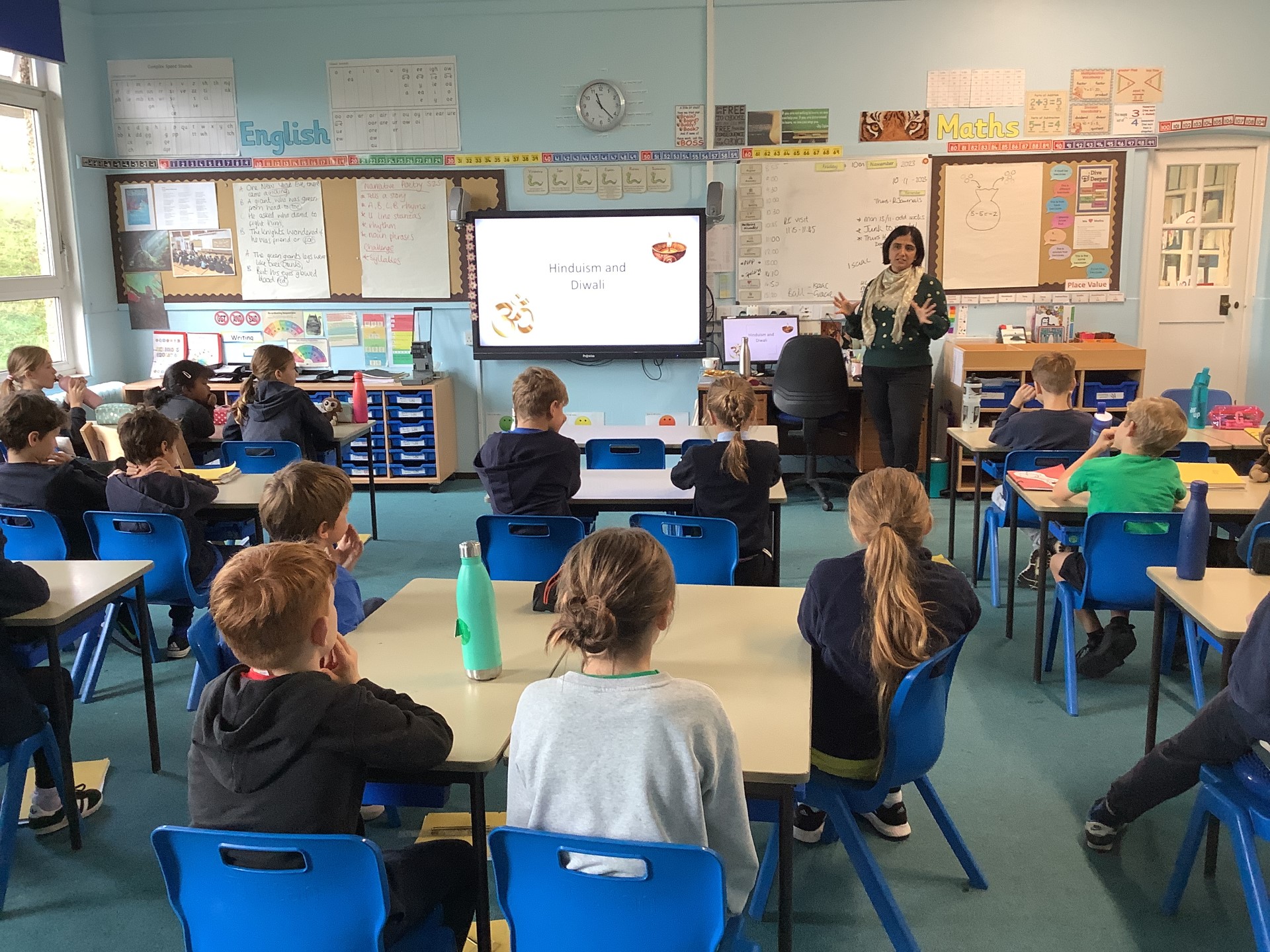

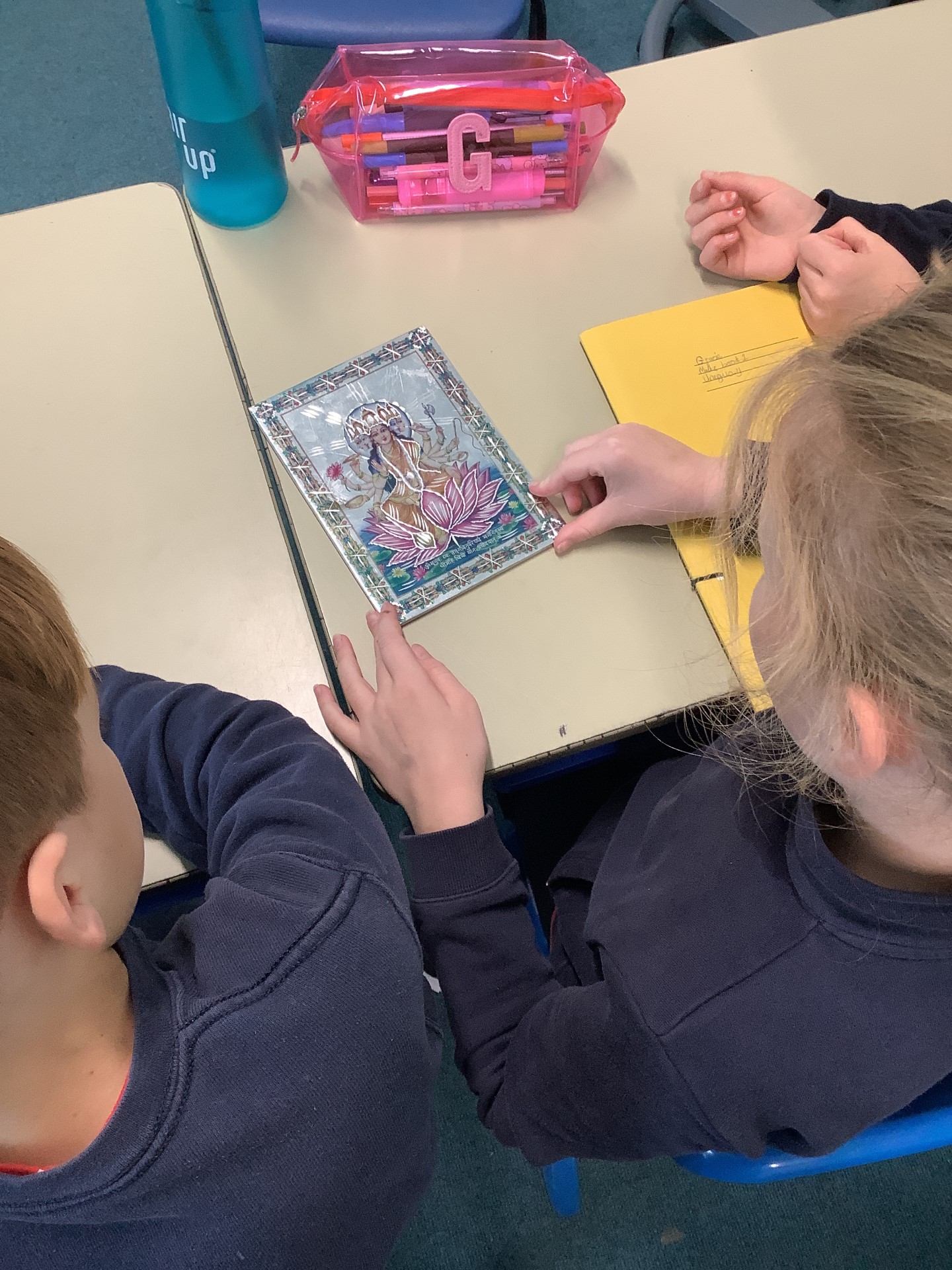
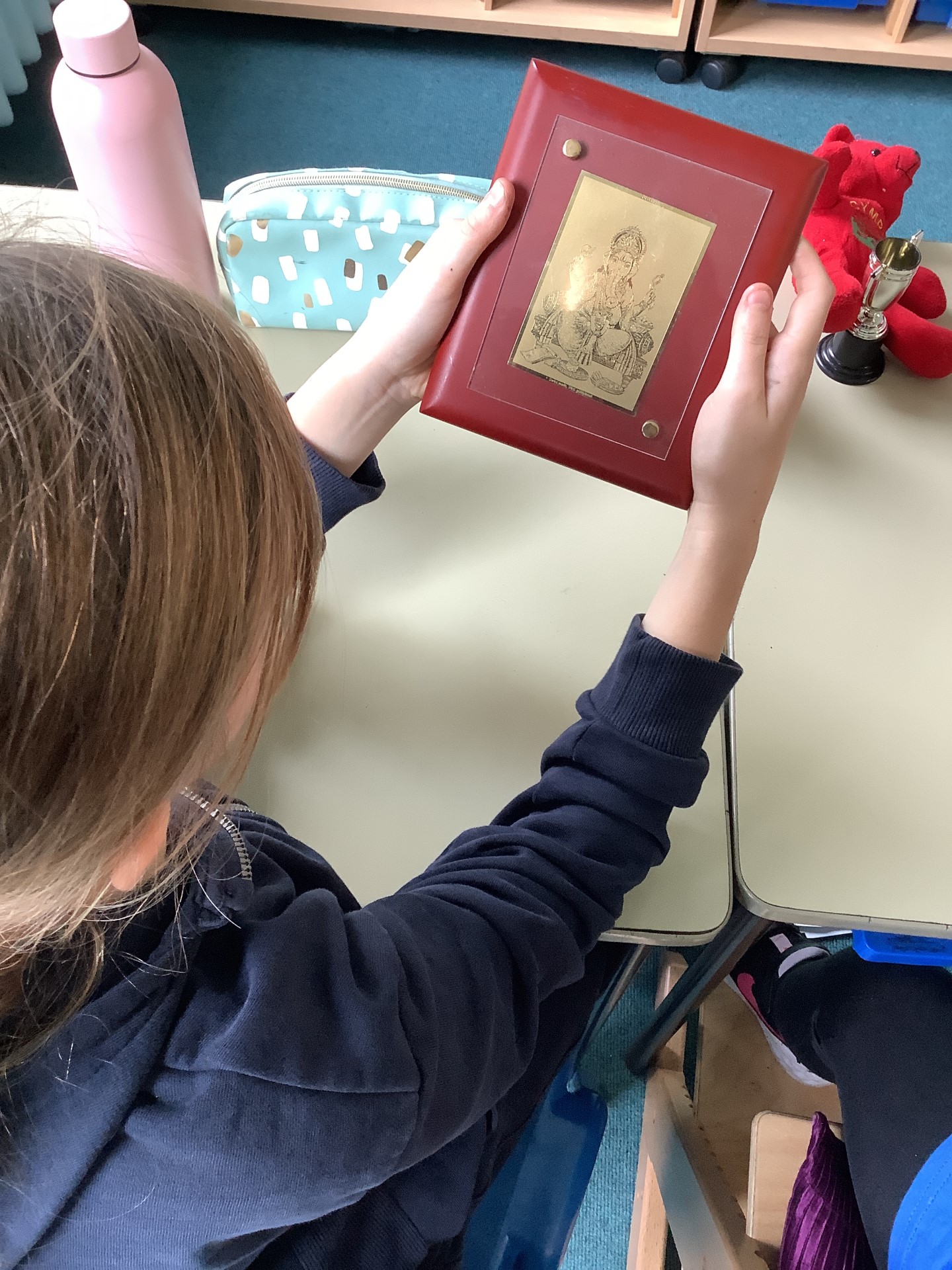
Autumn 2, Week 1
English: This week, we have finished writing our narrative poems linked to our story about Sir Gawain. We will be performing these to our buddy classes in Year 2 next week.
At home: You could practise reading aloud with expression and intonation. You could use a poem to practise reading with rhythm.
Maths: We have been learning about positive and negative numbers. We have been learning to read these numbers, place them on a number line and calculate the interval between two numbers.
At home: You could investigate temperature in different parts of the world. What are the differences between two countries?
RE: We had a fantastic visit from one of our parents linked to our learning about Diwali in our unit on Hinduism. We found out what Diwali is and how it is celebrated.
Autumn 2, Week 1
English: This week, we listened to Mr Gunn perform a narrative poem about King Arthur. We have now started writing our own.
At home: You could investigate rhymes and other poems that have an ABCB rhyming pattern.
Maths: We have been applying our knowledge of decimals to add and subtract amounts of money using different methods. We have also worked out change using number lines and column addition and subtraction.
At home: You could look at different coins and set up your own shop to practise adding totals and working out change. You could also visit a real shop if you’re allowed.
Science: We started our new unit all about Forces. We experimented with levers and pulley in our lesson (see photos).
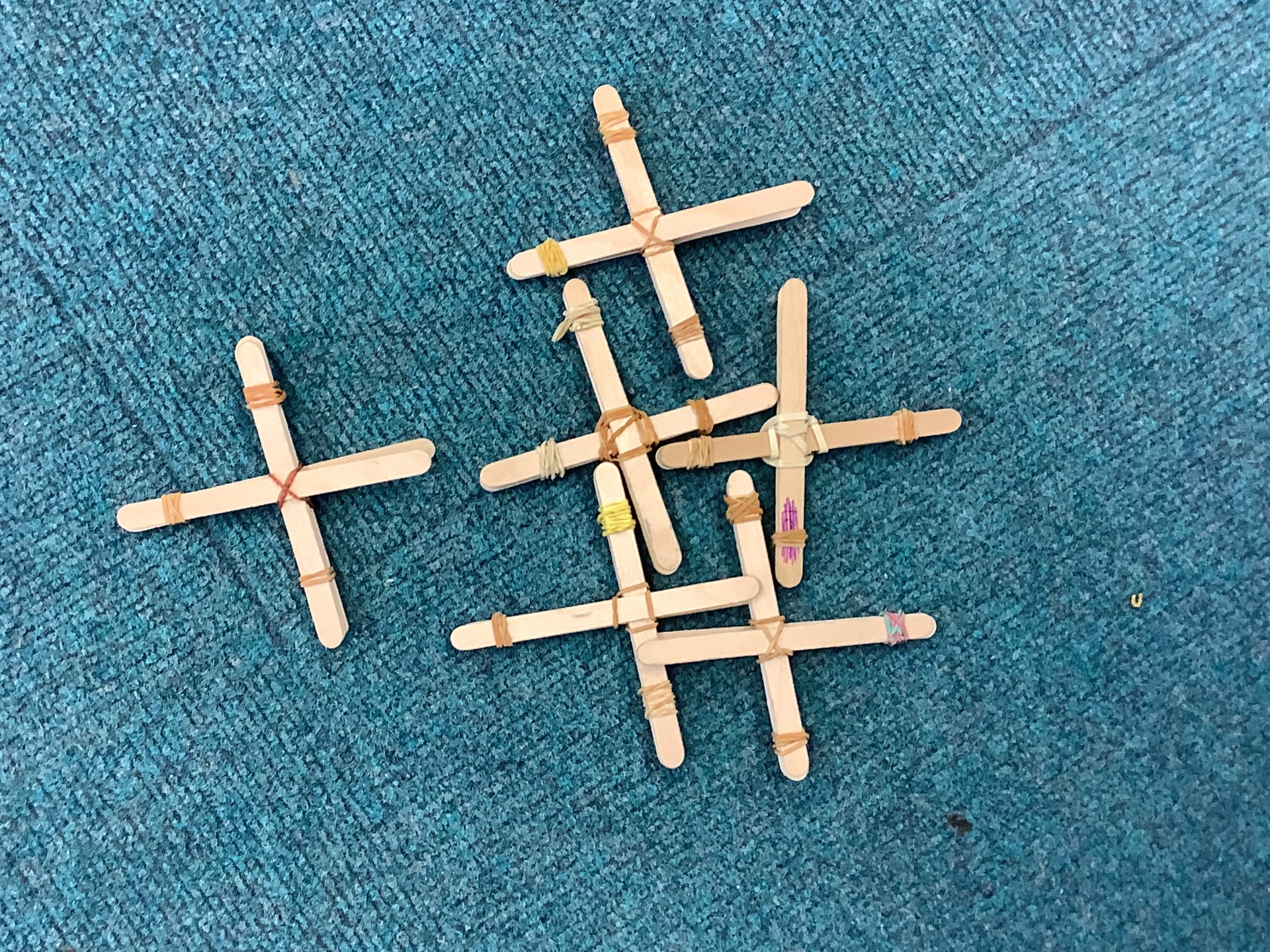
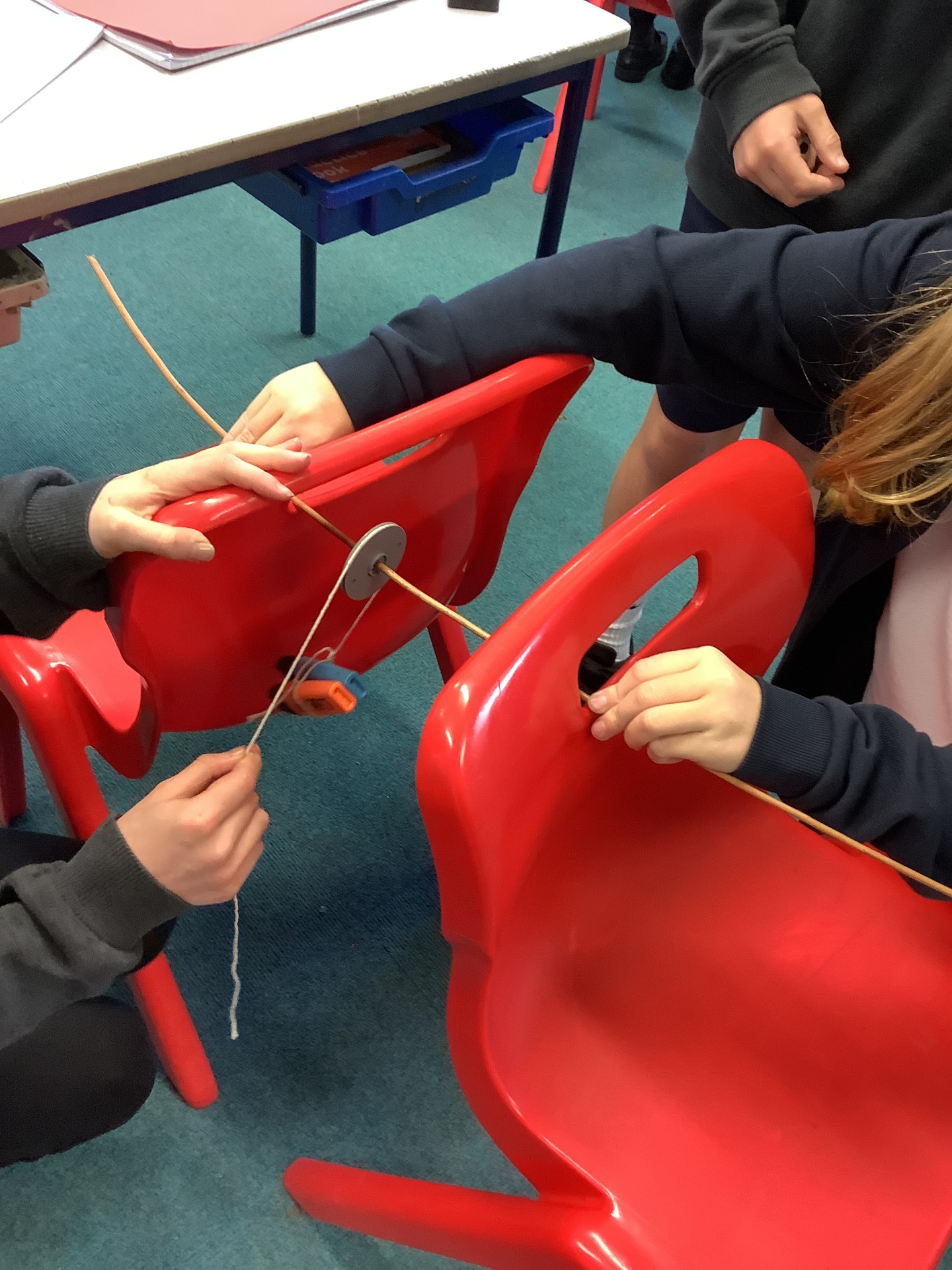
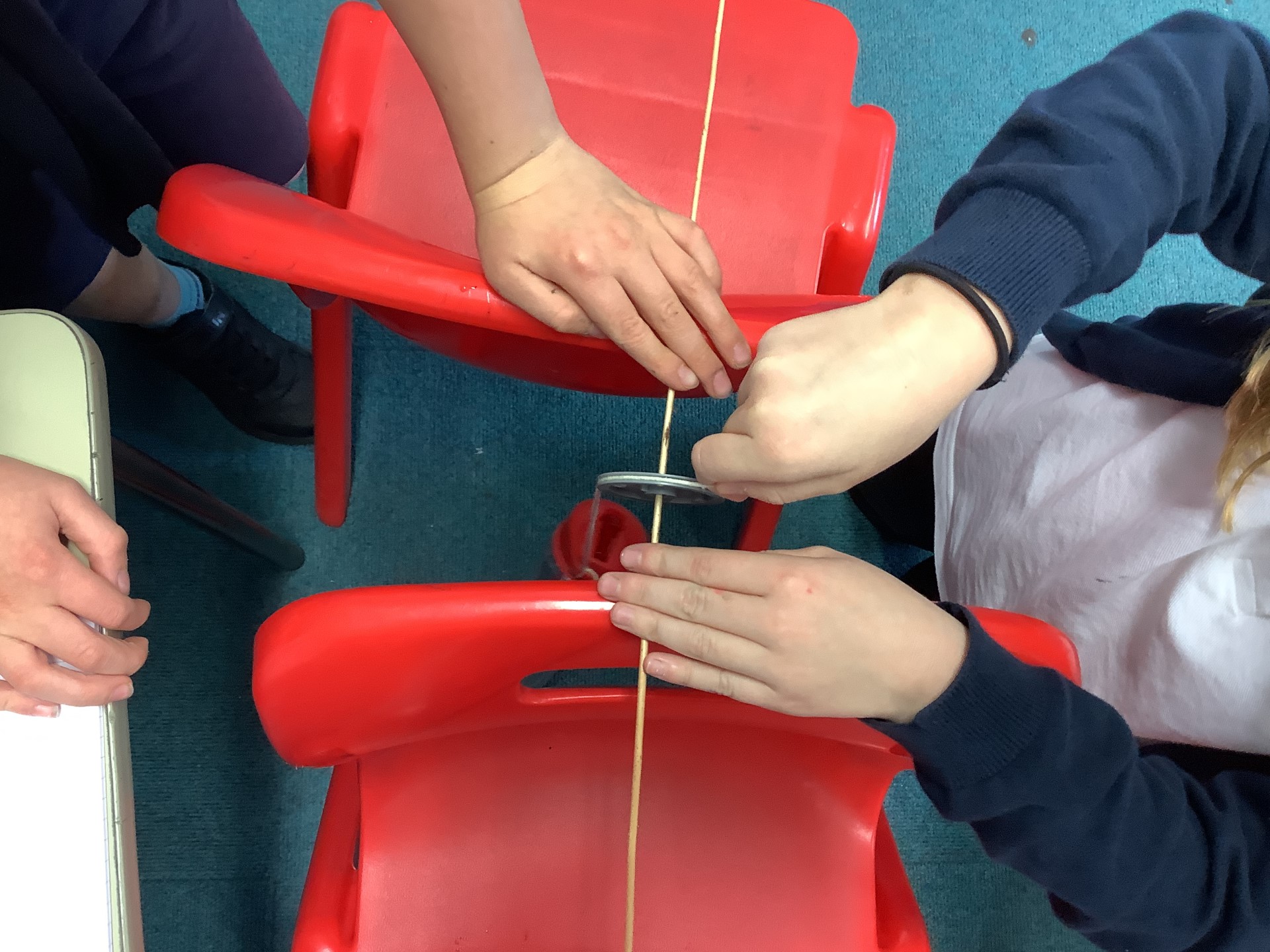
Environment: Ukraine had their first session of Nature School and had a brilliant time!
At home: find some more resources for our Nature School bag including conkers, acorns, pine cones, feathers and beech nuts.
Autumn 1, Week 7
English: This week, we have completed, edited and published our recounts of Sir Gawain and the Green Knight. You might have seen them at parents evening!
At home: You could investigate other legendary stories. Do you think that there might be some truth in them? Why or why not?
Maths: We have been applying our knowledge of decimals to add and subtract amounts of money using different methods. We have also solved problems with them.
At home: You could look at different coins and set up your own shop to practise adding totals and working out change. You could also visit a real shop if you’re allowed.
Science: We are finishing our unit on changing materials this week or next week, depending on the class. We looked at a variety of irreversible changes and why these cannot be changed back, including mixing lemon and bicarbonate of soda, mixing effervescent tablets with water and some classes have even been trying to burn cotton wool in the nature reserve by starting our own fires.Art: Ukraine class visited Preston Park as part of our unit about sketching. We loved having parents with us to join in with this learning.
Environment: We have had a fantastic visit from Sussex Underwater who talked to us about all of the creatures and plants which can be found off the Sussex coast and how this has changed over time.
At home: find out more about this brilliant organisation through Facebook and Instagram.
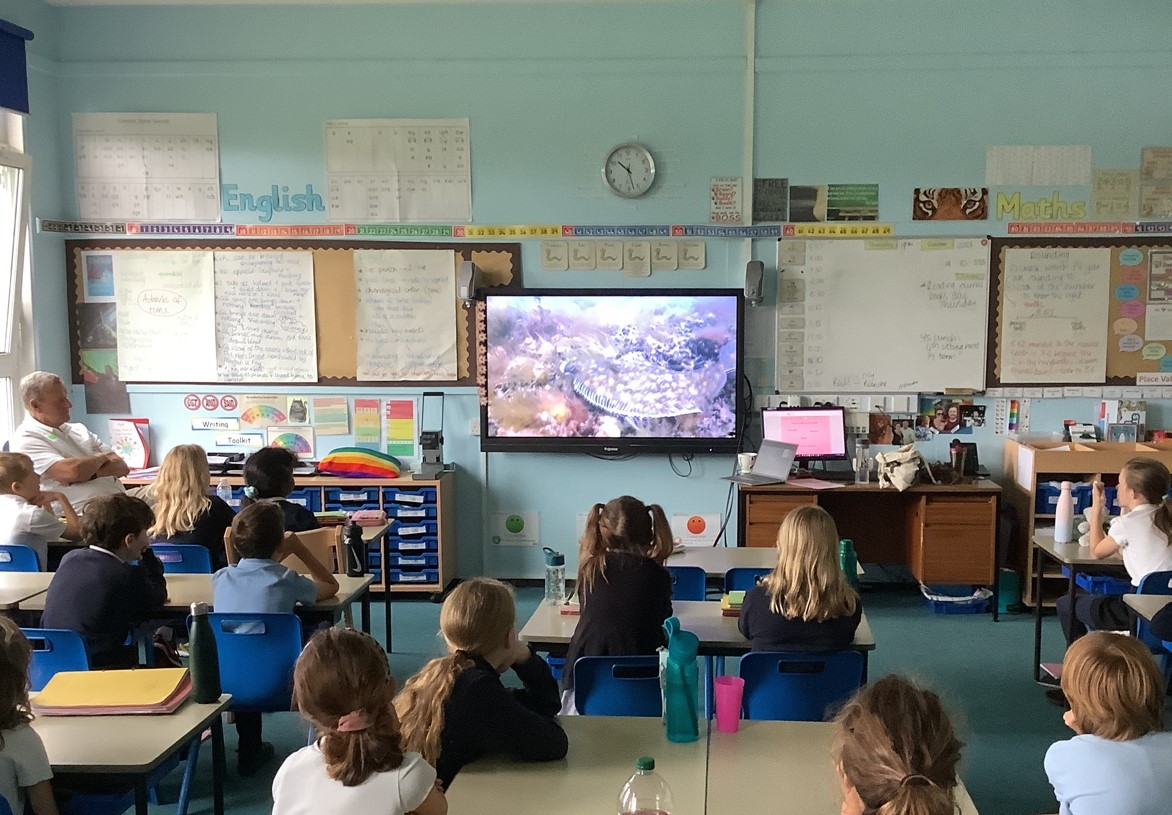
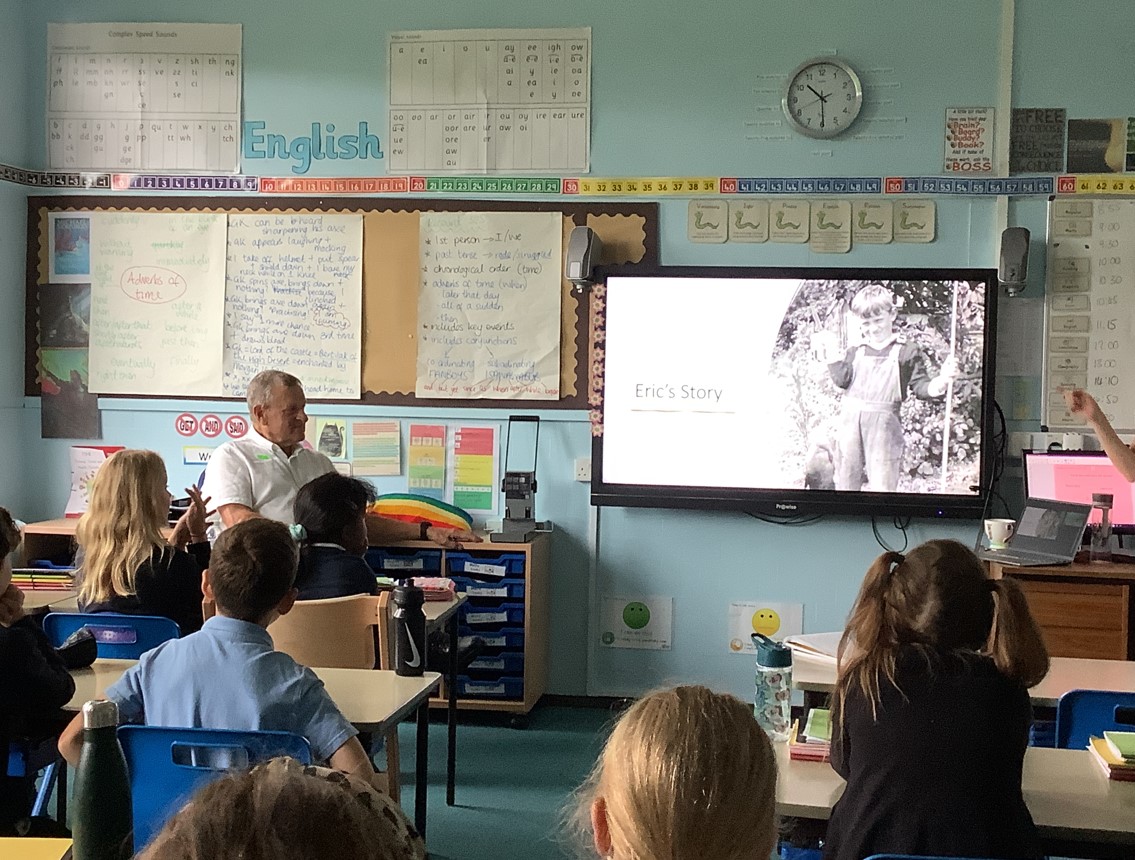

Previous Weeks' Learning
Autumn 1, Week 6
English: This week, we have been hearing the last part of our story about Sir Gawain and the Green Knight. We have started writing a recount of the final section, imagining that we are Sir Gawain telling the story to the knights of the round table.
At home: You could investigate other stories told about King Arthur and his knights. Do you think they are true? Why or why not?
Maths: We have been revising number, looking at rounding to tenths and wholes using numbers with two decimal places (hundredths). We have also began working with numbers to 3dp and looking at ordering these.
At home: You could look at rounding decimals that you can find around the house (meters, measurements, temperatures etc).
Science: We are finishing our unit on changing materials this week or next week, depending on the class. We looked at a variety of irreversible changes and why these cannot be changed back, including mixing lemon and bicarbonate of soda, mixing effervescent tablets with water and some classes have even been trying to burn cotton wool in the nature reserve by starting our own fires.
Art: Uruguay and UK class visited Preston Park this week to create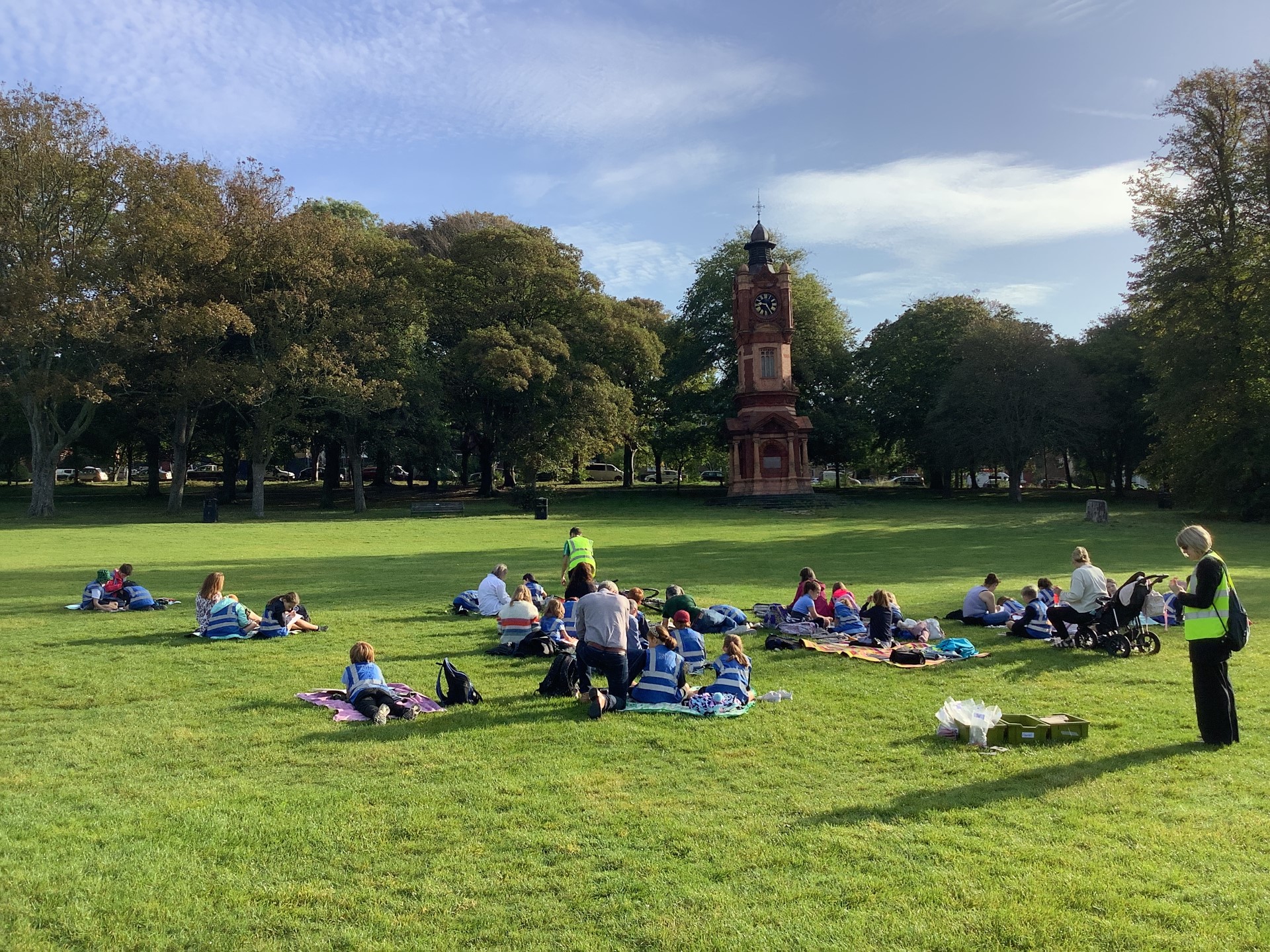 sketches of the clock tower as part of our drawing unit. Ukraine class will visit next week when the weather is more favourable.
sketches of the clock tower as part of our drawing unit. Ukraine class will visit next week when the weather is more favourable.
Environment: We have been in the nature reserve attempting to start fires to learn about irreversible changes. In geography, we have also been learning about how the coastline changes through physical and human impact.
At home: if you’re near the beach, you could look at the waves and the impact they have on our coast. Can you find any evidence of what helps to prevent out shoreline from being destroyed by waves?
Autumn 1, Week 5
English: We have been editing and publishing our diary entries in role as Gawain from our text ‘Gawain and the Green Knight’. We have read further in the text and made predictions about what will happen next.
- At home: You could explain the plot of the book to your family and tell them your prediction.
Maths: We have been working with hundredths. We have added and subtracted them using the column method and solved some word problems.
- At home: You could look add or subtract 2 amounts of money e.g. £7.99-£4.25 =
Environment: We have been finding out about important features of our coastline and how the sea deposits them to create beaches, spits and lagoons. We learnt about longshore drift and tried to create this effect using sand and water in trays as well as drawing it on the playground. (See photos).
- At home: you could visit the beach and look at how the waves move and the effect on sand and shingle.
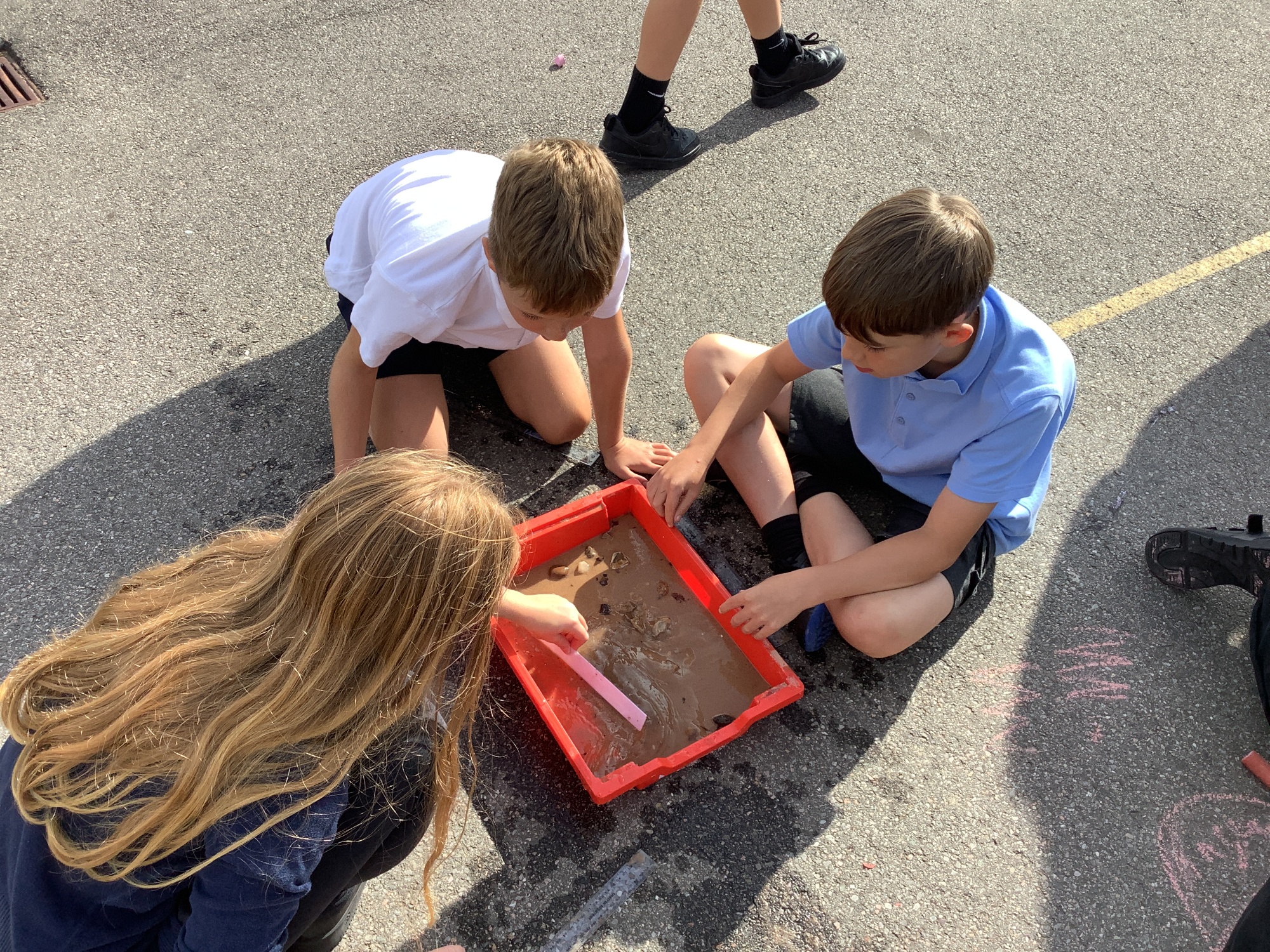
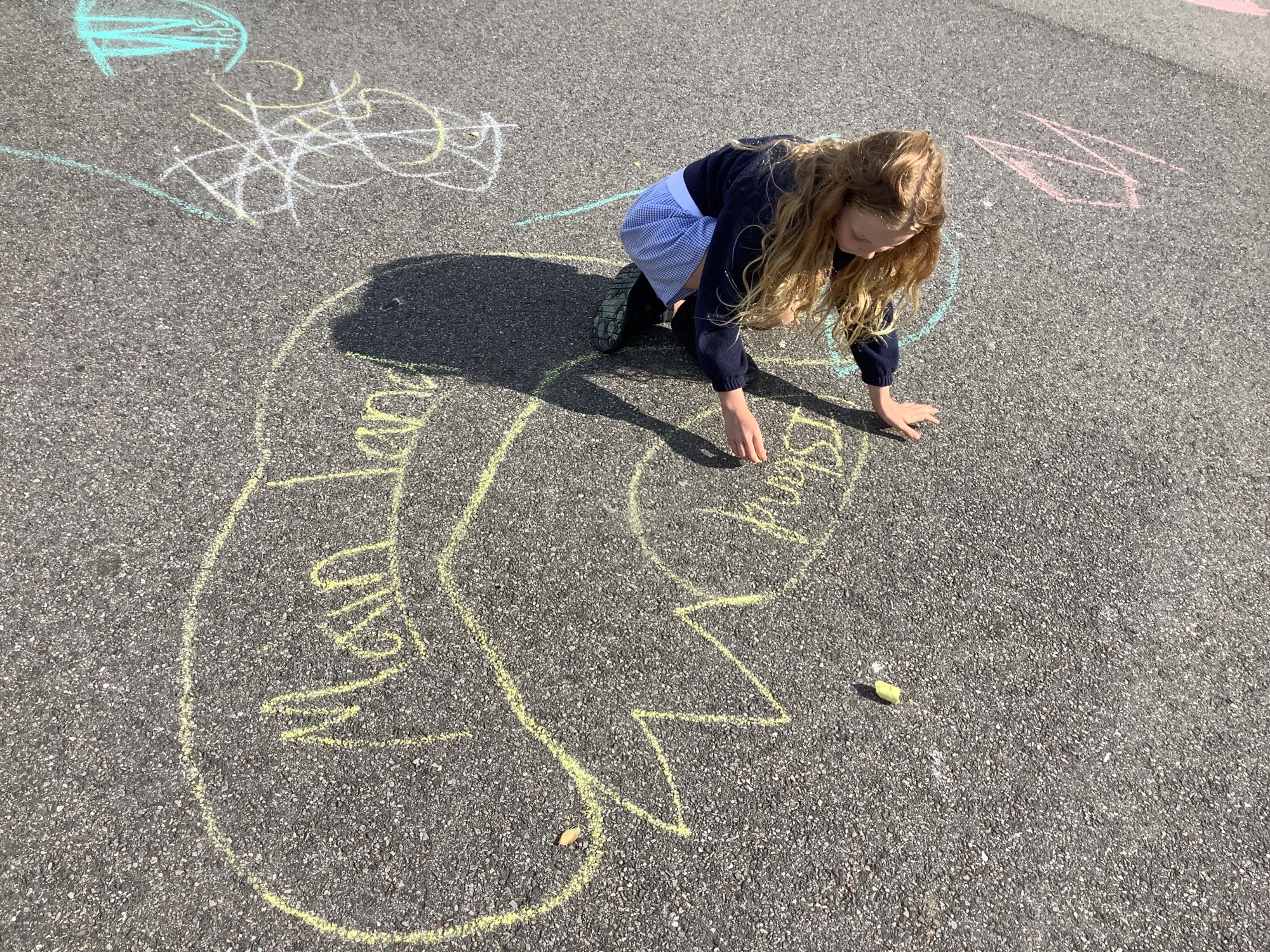
Autumn 1, Week 4
English: We have been writing diary entries including description of setting and character from the perspectives of Sir Gawain from our book ‘Sir Gawain and the Green Knight’.
- At home: You could write your own diary entry about your day.
Maths: We have been revising number, looking at hundredths as a fraction and a decimal. We have been partitioning decimals in different ways.
- At home: You could look at how we use hundredths when we talk about money e.g. £3.25 and make the amounts using coins.
Environment: We have been doing a science experiment where we thought about how to separate materials that had been mixed together with water, using different equipment (see photos). We thought about why water is dirty for so much of the global population and how it could be made clean.
- At home: you could find out about charities that support people who do not have clean water to drink.
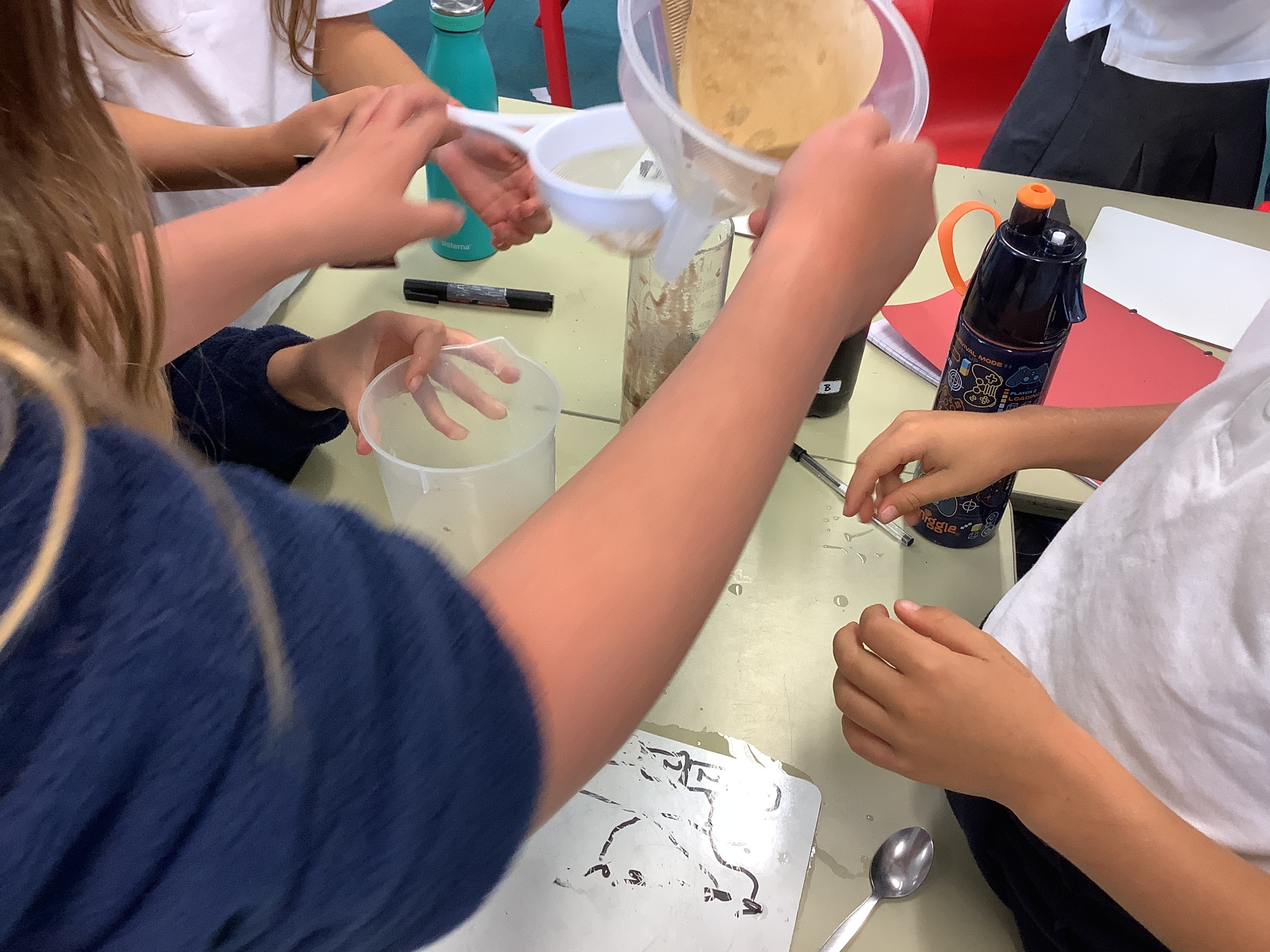
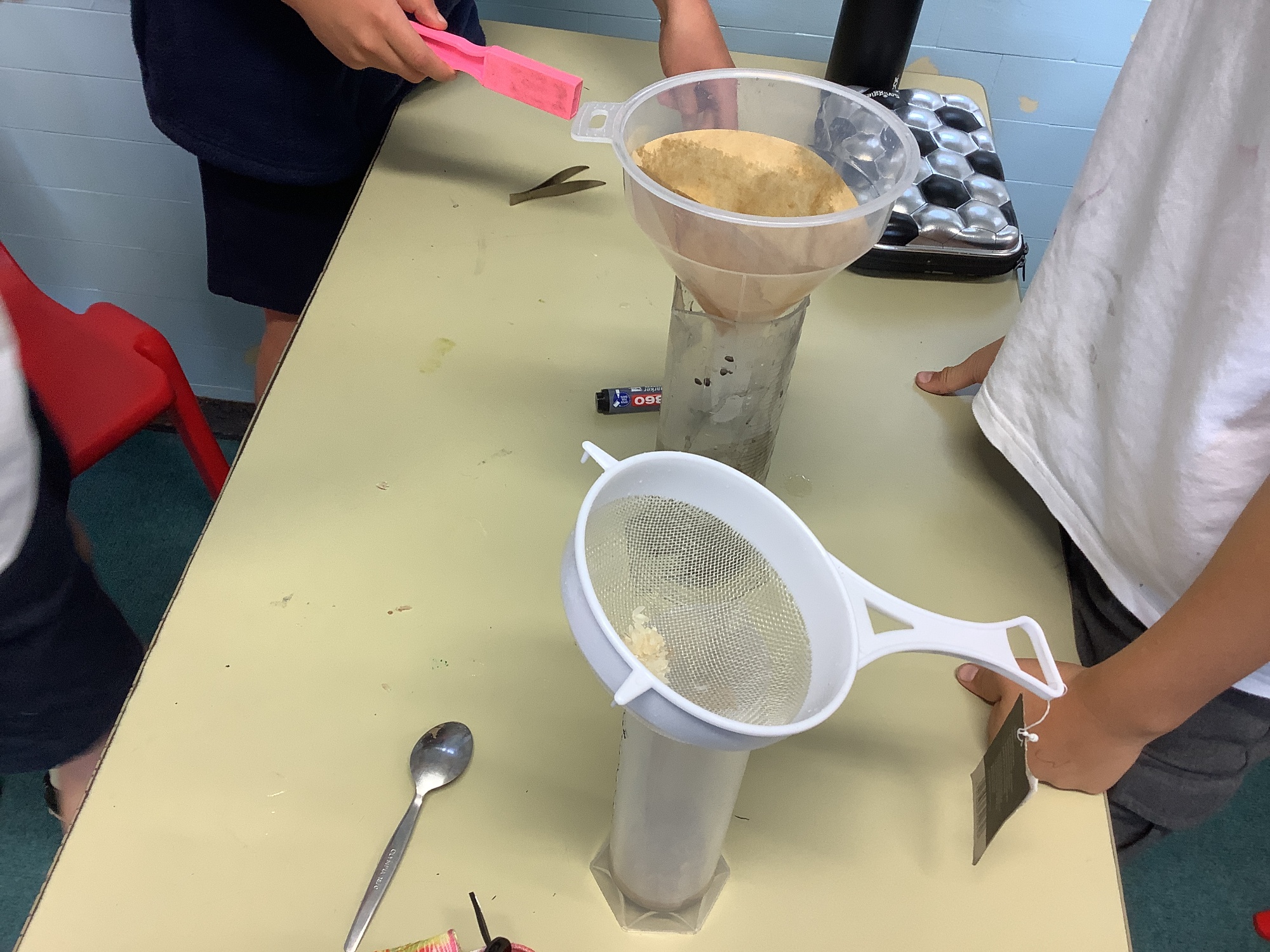
Autumn 1, Week 3
English: We have continued reading ‘Sir Gawain and the Green Knight.’ We wrote a character description of the Green Knight. Then we created maps of his journey (see photos).
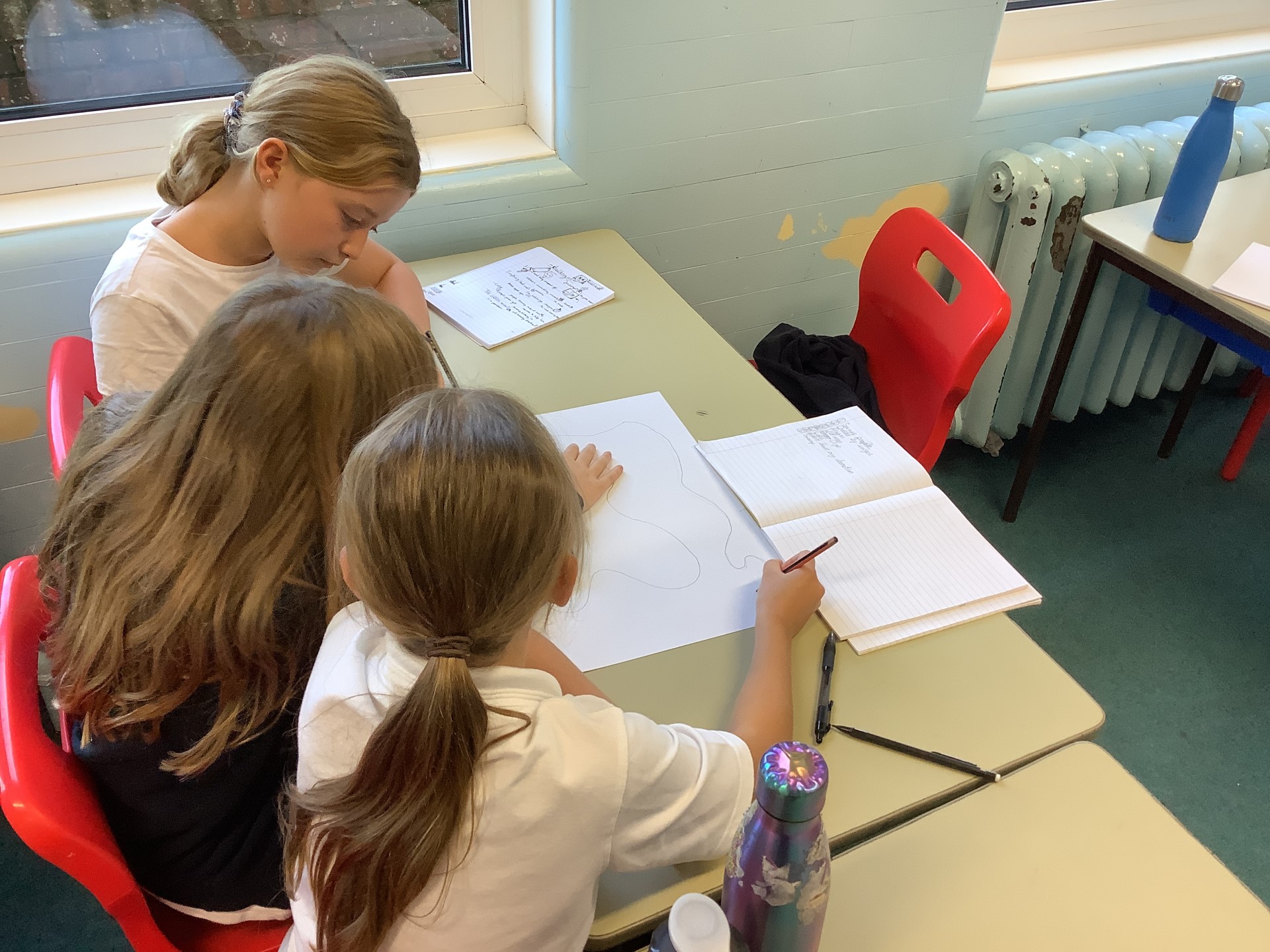
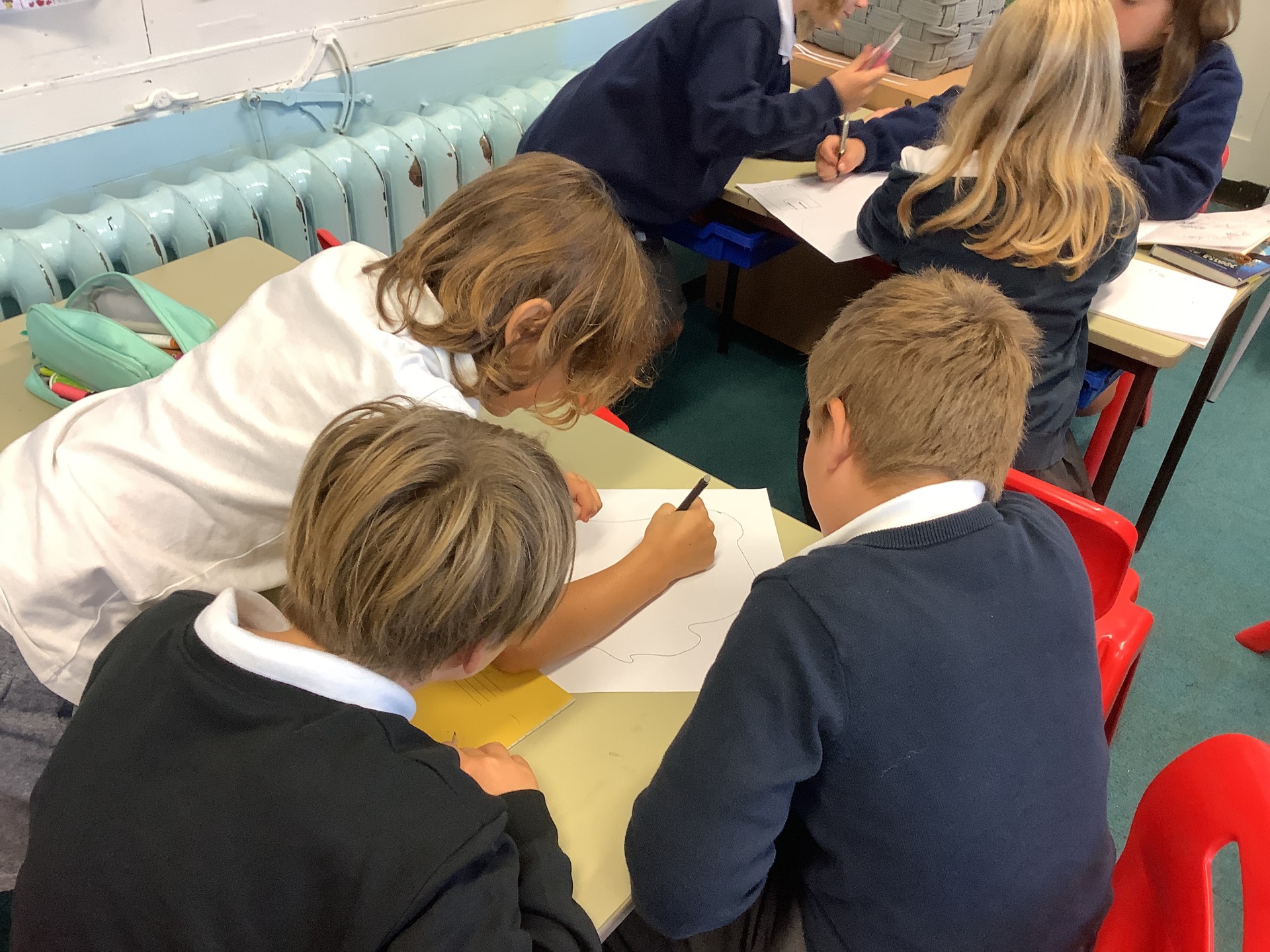
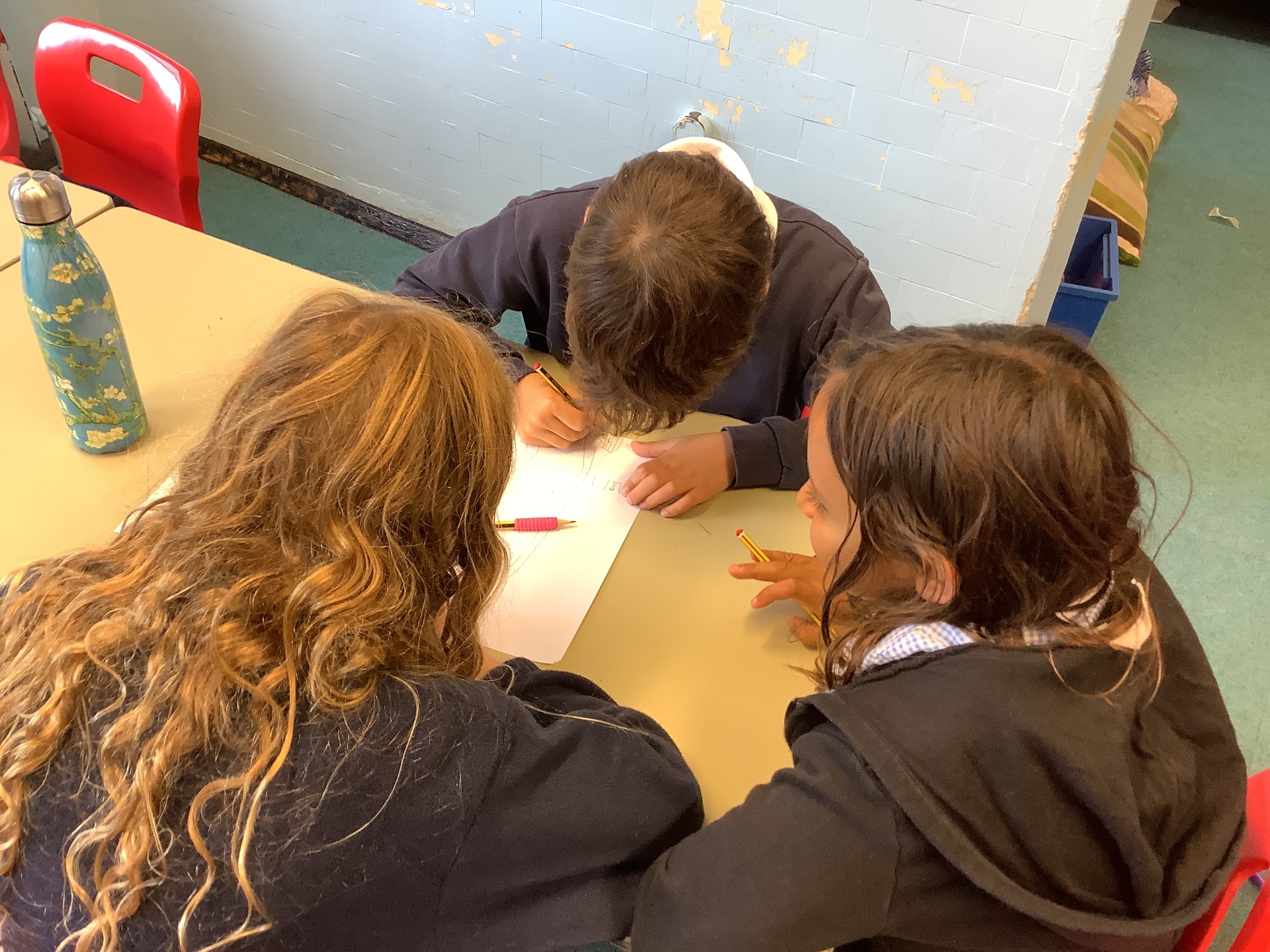
- At home: You could use a thesaurus to look at new vocabulary to describe characters or settings.
Maths: We have been adding and subtracting decimals using the column method. We have also been rounding decimals to the nearest whole number.
- At home: You could practise adding numbers in columns e.g. 4.5+3.6
Environment: We have started to learn about our coastline in Geography lessons.
- At home: you could visit the beach and see what features of the coast you can see.
Autumn 1, Week 2
English: We have been reading the start of our new text, ‘Sir Gawain and the Green Knight’ by Michael Morpurgo. We drew pictures of the knight from the description.
- At home: You could explain what the Green Knight looks like to someone at home.
Maths: We have been revising numbers, looking at tenths as a fraction and a decimal
- At home: You could ask for a number and then attempt to divide it by ten to find a tenth.
Environment: We have had our WOW start to our coasts topic in geography with a social responsibility day about the ocean. We have learnt about how the sea helps us and the development of sea kelp along the Sussex coast.
- At home: You could investigate the sea kelp forest along the Sussex coast and see how you could support it from charities such as Sussex Seabed Restoration Project.
Autumn 1, Week 1
It has been such a lovely start to year 5. The children have come back and really settled into their routines.
English: We have been revising what a basic sentence needs as well as looking at how to use adverbs to make our writing more interesting.
At home: You could look at any writing and think about the choice of adjectives and adverbs – could you find a better synonym (word)?
Maths: We have been revising number, looking at place value and rounding.
At home: You could identify the value of each digit in a number and round it to the nearest 10, 100 or 1000.
Environment: We have been learning how to use treasury tags in our books at school so that we don’t need to use glue sticks.
At home: What small changes could you make at home to help the environment?
